16 Times Alleged Affairs, Rumored Feuds, And Other Reported Scandals Got More Attention Than The Movies That Spawned Them
Rumors about alleged affairs, feuds, etc. can bring a lot of attention to a film. Sometimes, however, the behind-the-scenes drama surrounding a movie overshadows the onscreen drama.
Here are 16 movies that are remembered more for their behind-the-scenes drama than the actual plot line:
1.It Ends With Us (2024), which is based on the novel by Colleen Hoover, is about a flower shop owner who navigates an abusive relationship and the generational cycle of domestic violence. However, rumors of an alleged feud between lead actor Blake Lively and director/costar Justin Baldoni have seemingly dominated discourse about the movie.

Fans have speculated there may be a feud because Baldoni didn't walk the premiere red carpet or do press alongside his castmates. However, he told a red carpet reporter that he wanted the premiere to celebrate women, not himself.


Cindy Ord / Getty Images, Gotham / WireImage / Via Getty
At the premiere, he told Entertainment Tonight, "This isn't my night — this is a night for all the women who we made this movie for. This is a night for Blake, this is a night for Colleen. I'm just so grateful that we're here, five years in the making."
Sources alleged to The Hollywood Reporter that, during post-productions, the filmmakers disagreed, resulting in two different cuts. Multiple sources told the outlet that Lively had Shane Reid, who edited Deadpool & Wolverine as well as "I Bet You Think About Me" (the Taylor Swift music video Lively directed), do a cut of the movie.

As a producer, Lively contributed to the movie's creative direction.
Her husband, Ryan Reynolds, also got involved with the script.
She told E! News, "We help each other. We work together so much. The iconic rooftop scene in this movie — my husband actually wrote it...He works on everything I do. I work on everything he does. So his wins, his celebrations are mine, and mine are his. I mean, he's all over this film."
At the premiere, Baldoni shot down the idea of directing and starring in the sequel, telling Entertainment Tonight, "I think there are better people for that one. I think Blake Lively's ready to direct. That's what I think."

However, the film and its press tour have also garnered criticism for the way they approach the themes of domestic violence.

You can read a full breakdown here.
2.Don't Worry Darling (2022) is about a housewife who discovers her seemingly perfect town isn't quite what it seems, but chatter around the movie's release seemed more focused on a rumored feud between lead actor Florence Pugh and director Olivia Wilde, who was dating lead actor Harry Styles at the time.

In July 2022, a purported source alleged to Page Six, "I can tell you for a fact that Flo seeing Olivia and Harry all over each other on set did not go down well as Olivia was still with Jason [Sudeikis] when she first hooked up with Harry."

Likewise, in August 2022, a source alleged to Us Weekly, "Florence and Olivia have had several disagreements personally and professionally, that's why Florence isn't doing any press for the movie."
Wilde and Pugh seemed to publicly disagree about discourse surrounding the film's sex scenes.

In January 2022, Wilde told Vogue, "I kept saying, 'Why isn't there any good sex in film anymore?'" She also said she wants to make her audience "realize how rarely they see female hunger, and specifically this type of female pleasure."
Then, in August 2022, Pugh told Harper's Bazaar, "When it's reduced to your sex scenes, or to watch the most famous man in the world go down on someone, it's not why we do it. It's not why I'm in this industry. Obviously, the nature of hiring the most famous pop star in the world, you're going to have conversations like that. That's just not what I'm going to be discussing because [this movie is] bigger and better than that. And the people who made it are bigger and better than that."
Fans also pointed out how Pugh rarely posted about the film, and when Wilde made a post praising her, she didn't publicly acknowledge it.
In August 2022, Wilde told Variety she fired Shia LaBeouf, who was initially cast in Styles's role, to "protect" the rest of her cast from his "combative energy." However, he denied her version of events.


Rodin Eckenroth / Getty Images, Mondadori Portfolio / Mondadori Portfolio via Getty Images
She told Variety, "I say this as someone who is such an admirer of his work. His process was not conducive to the ethos that I demand in my productions. He has a process that, in some ways, seems to require a combative energy, and I don't personally believe that is conducive to the best performances. I believe that creating a safe, trusting environment is the best way to get people to do their best work. Ultimately, my responsibility is to the production and to the cast to protect them. That was my job.
A lot came to light after this happened that really troubled me, in terms of his behavior. I find myself just really wishing him health and evolution because I believe in restorative justice. But for our film, what we really needed was an energy that was incredibly supportive. Particularly with a movie like this, I knew that I was going to be asking Florence to be in very vulnerable situations, and my priority was making her feel safe and making her feel supported."
In December 2020, FKA Twigs, LaBeouf's ex-girlfriend, sued him for alleged assault, sexual battery, and inflicting emotional distress.
In an email, LaBeouf told Variety that he "quit the film due to lack of rehearsal time." He sent Variety emails and texts that he and Wilde allegedly exchanged.
In a video Wilde allegedly sent him, she said, "I feel like I'm not ready to give up on this yet, and I, too, am heartbroken, and I want to figure this out. You know, I think this might be a bit of a wake-up call for Miss Flo, and I want to know if you're open to giving this a shot with me, with us. If she really commits, if she really puts her mind and heart into it at this point, and if you guys can make peace — and I respect your point of view, I respect hers — but if you guys can do it, what do you think? Is there hope? Will you let me know?"
And the film's premiere at the Venice Film Festival was also riddled with drama (some of it completely made up by viewers). The most notable moment was "Spitgate," when fans speculated that Styles spit on costar Chris Pine, whose rep denied the "ridiculous story."

In a statement to Variety, they said, "This is a ridiculous story — a complete fabrication and the result of an odd online illusion that is clearly deceiving and allows for foolish speculation, just to be clear, Harry Styles did not spit on Chris Pine. There is nothing but respect between these two men, and any suggestion otherwise is a blatant attempt to create drama that simply does not exist."
In October 2022, costar Nick Kroll told The Hollywood Reporter, "The Don't Worry Darling trailer came out, and people were excited about it. People have been thinking about this movie for a while. Then all of the mishegas happens, the drama around the movie started to take hold, and I was not a part of any of that. I'm not distancing myself at all, I just wasn't doing press at that point. My first exposure to it all was literally on the red carpet in Venice, and I was like, 'Ohhhh, I think people might be interested in this.' And I was right."
3.Anyone But You (2023) is a loose Much Ado About Nothing retelling with a lovers-to-enemies-back-to-lovers main couple who reunite during a wedding. Ahead of the movie's release, fans speculated that lead actors Sydney Sweeney and Glen Powell, who were both in relationships with other people at the time, were allegedly having an affair.

Powell's then-girlfriend, Gigi Paris, seemingly unfollowed Sweeney on Instagram, adding fuel to the fire.
In August 2023, Sweeney told Variety, "It's a rom-com. That's what people want! Glen and I don't really care. We have so much fun together, and we respect each other so much; he's such a hard worker, and I'm a hard worker. We're excited for the press tour, and I literally just left ADR with him. We talk all the time like, 'That's really funny.'"

Then, that December, she told Glamour UK, "It was really hard on Glen, which made me sad… because [otherwise] it was such a beautiful experience for the both of us. I care for him so much...Also, I've never really shared that much [about my relationship], so the press loves to create drama in stories."
However, in 2024, Powell revealed that playing into the rumors to promote the film had been Sweeney's idea.

He told the New York Times, "The two things that you have to sell a rom-com are fun and chemistry. Sydney and I have a ton of fun together, and we have a ton of effortless chemistry. That's people wanting what's on the screen off the screen, and sometimes you just have to lean into it a bit — and it worked wonderfully. Sydney is very smart."
4.I Heart Huckabees (2004) is an independent comedy about a detective duo whose investigations center on "universal interconnectivity." It was overshadowed by two videos of an argument between actor Lily Tomlin and director David O. Russell that were leaked and went viral on YouTube.
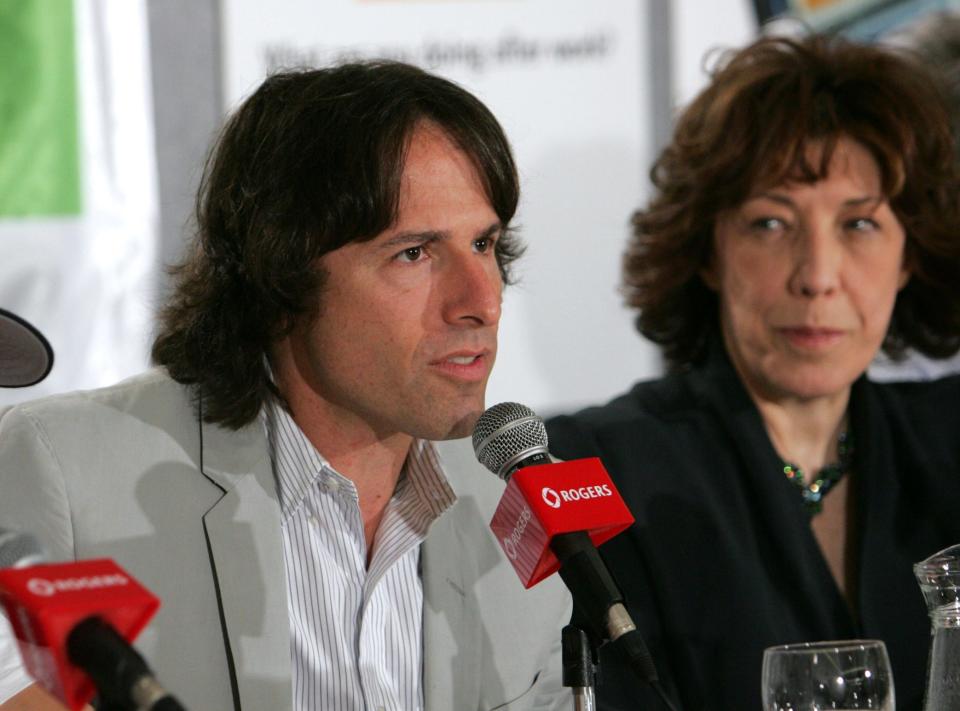
In his expletive-laden rant, Russell berated Tomlin, called her names, and insisted he was only trying to "help" her.
Russell's angry outburst came back to haunt him when he received a career tribute award at the 2012 IFP Gotham Awards. Comedian and host Mike Birbiglia recited the director's tirade as part of his opening monologue — but Russell took it in stride.


Theo Wargo / Getty Images for IFP, Larry Busacca / Getty Images for IFP
He told Vulture, "It’s old news! What are you going to do? I take it in good fun. You have to laugh at your mistakes."
In 2015, Tomlin told the Hollywood Reporter that they "made up in just a few hours, and then [they] had a second fracas."
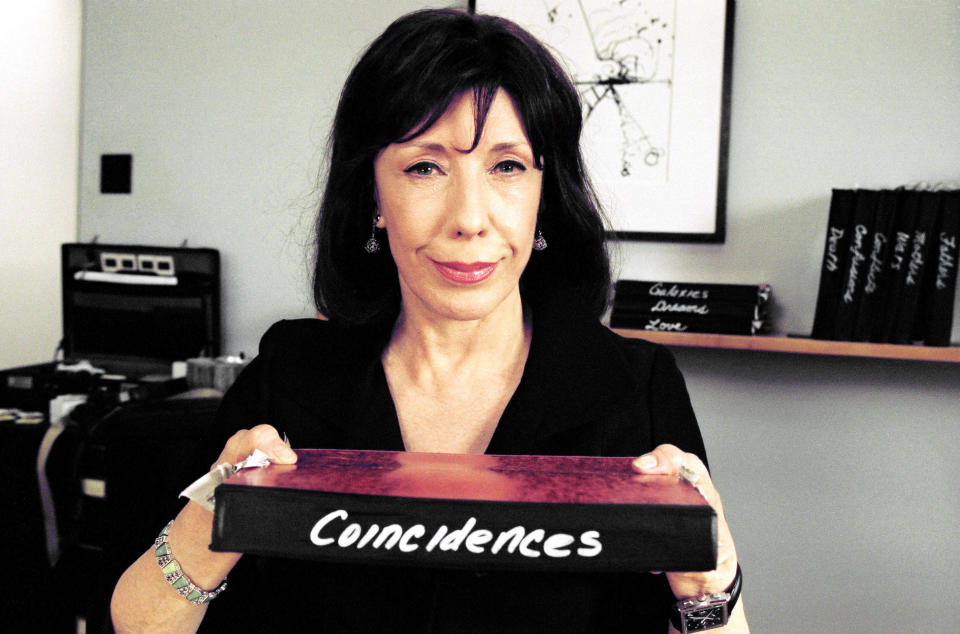
She continued, "By then, I was like stoic in my suffering. But we’ve overcome it. It dissipates and it’s gone. I was doing The Search [for Signs of Intelligent Life in the Universe] downtown every day when we were shooting. So I’d have to leave at five and head downtown. So I was probably overextended. But it wasn’t any big deal."
5.Suicide Squad (2016) follows Harley Quinn and her fellow DC supervillains. However, a lot of conversation about the movie surrounded the antics of actor Jared Leto, who played the Joker.
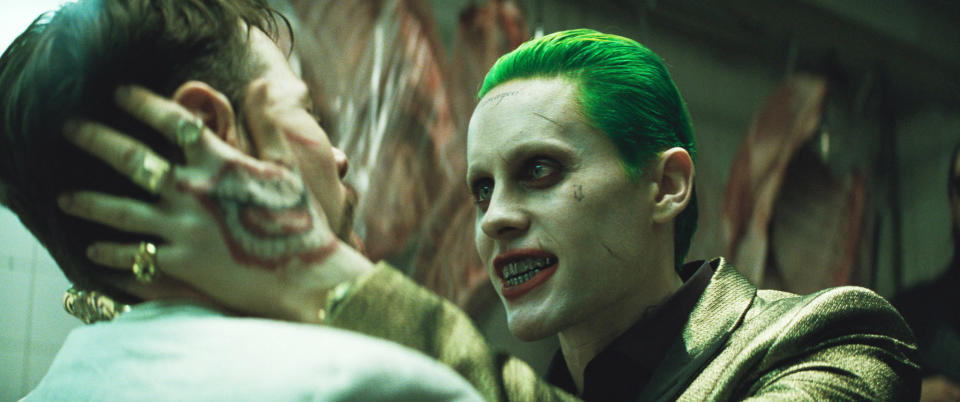
Viola Davis, who played Amanda Waller, told Vanity Fair, "He did some bad things...Jared Leto did."
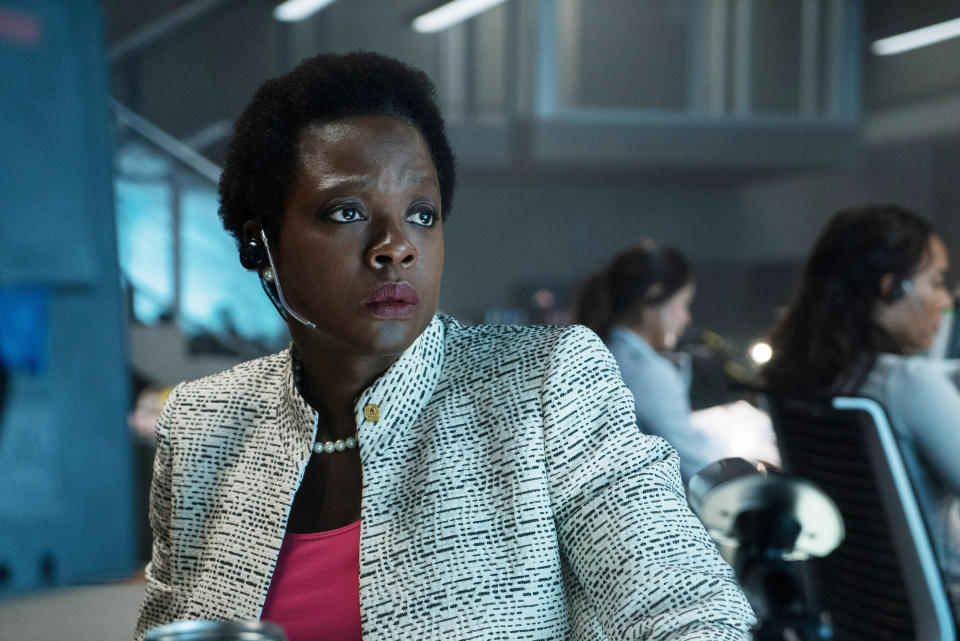
She said that it started with Leto arranging for a "henchman" to drop a dead pig on the table during rehearsals.
Leto gave Margot Robbie, who played Harley Quinn, a strange gift — a black rat in a box.
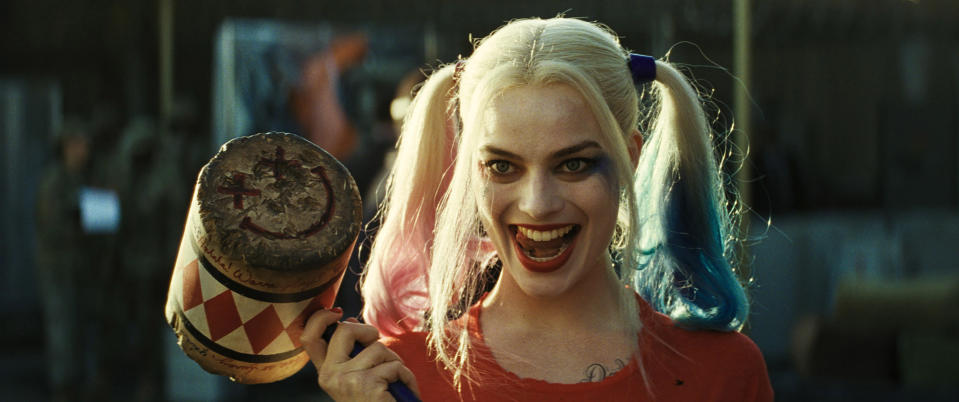
She told The Tonight Show Starring Jimmy Fallon, "At first I thought this was disgusting. But then after that...I was like, I'm not going to kill him. So I ended up keeping him as a pet. I ended up getting him like a sweet little playpen, a slide, a hammock, and a leash because I wanted to take him to set and walk him around... But then our landlord at the place I was staying found out."
Karen Fukuhara, who played Katana, was also an unfortunate recipient of the method actor's gifts. She told USA Today, "He did give me some odd, interesting gifts — some sex toys and my first porn magazine."
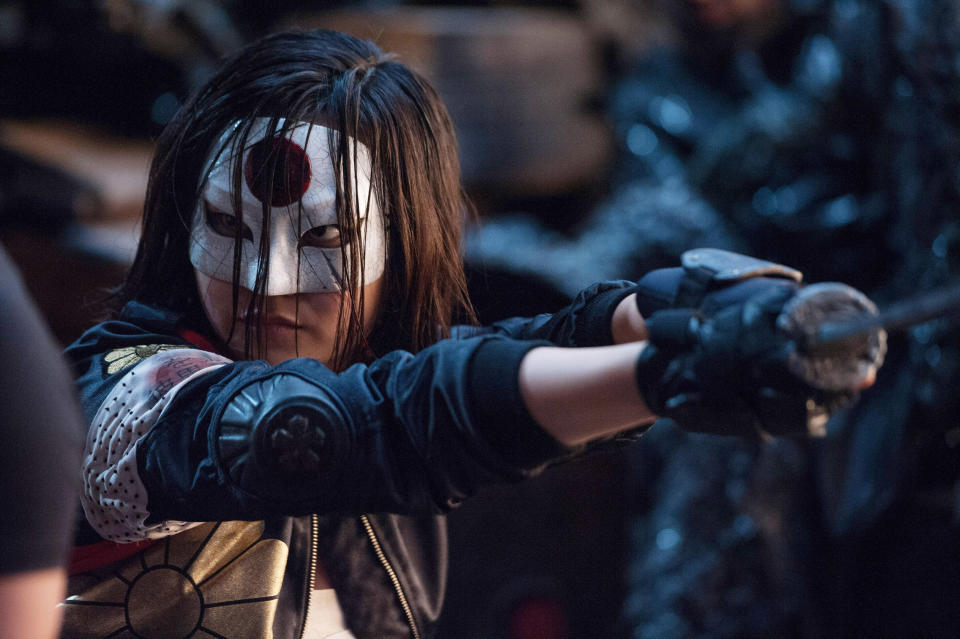
She said, "He was The Joker 24/7. The first day he was on set, I went up to him and said, 'Hi, I'm Karen, nice to meet you. I play Katana.' And he says, 'He, he, he, he, he. Hi, pretty.' It was the creepiest and coolest experience of my life."
Denying his previous comments about giving obscene gifts to the entire cast, Leto told Entertainment Weekly, "Any of the very few gifts that were ever given were given with a spirit of fun and adventure and received with laughter, fun, and adventure...I'm playing a guy called the Joker, it's okay to play some jokes. Nothing ever crossed any lines, and it's not up to other people on the internet to create those lines."
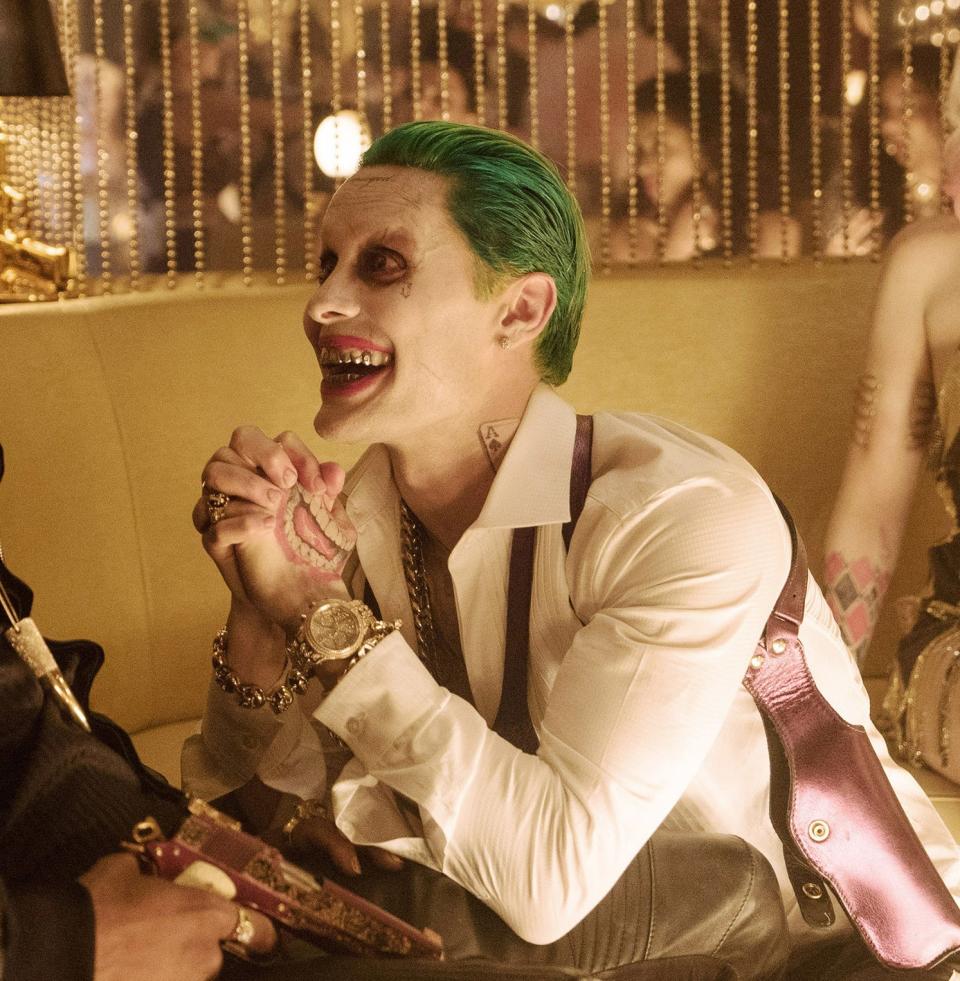
He continued, "I'm an artist at the end of the day. If I do something risky and you don't like it, basically, you can kiss my ass."
6.Super Mario Bros (1993) is an adventure comedy based on the popular Nintendo game, but husband and wife directing duo, Rocky Morton and Annabel Jankel, wildly veered from the source material and took the project in a darker direction.
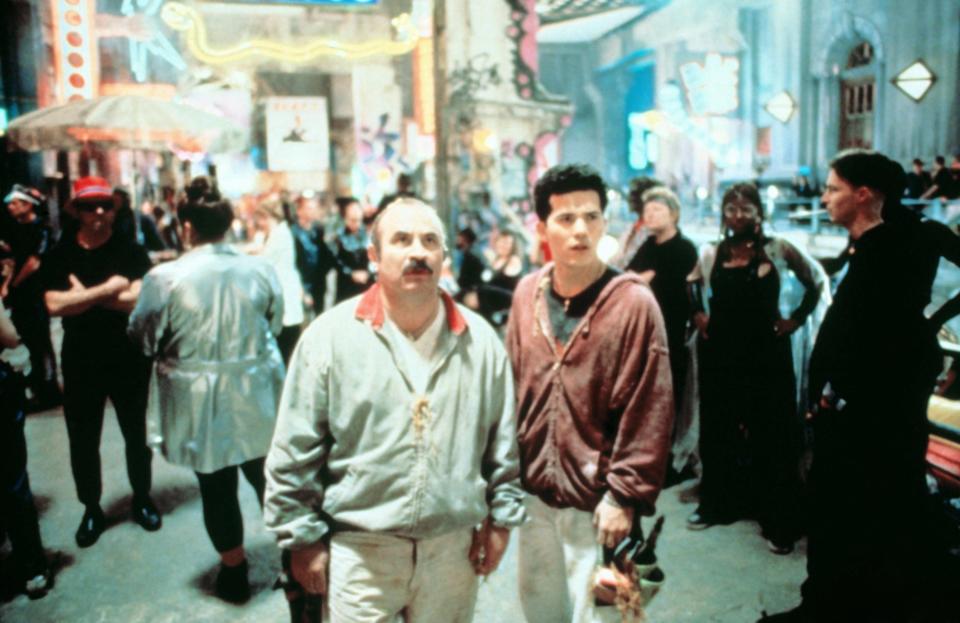
They set the film in Dinohatten, a dinosaur-run alternate universe version of New York City that was still connected to the "real world" through a portal.
Production was rushed due to a strict deadline that came with financial penalties, and the multiple script rewrites pulled inspiration from Mad Max and Die Hard.
Morton told Game Informer, "I wanted the film to be more sophisticated...I wanted to make a film that would open it up and get parents interested in video games."
However, the directors' vision clashed with the studio's expectations for a lighthearted kids' movie — which the cast and crew largely shared. Tensions mounted; rewrites continued. The producers fought the directors to include Mario and Luigi's iconic overalls and won.
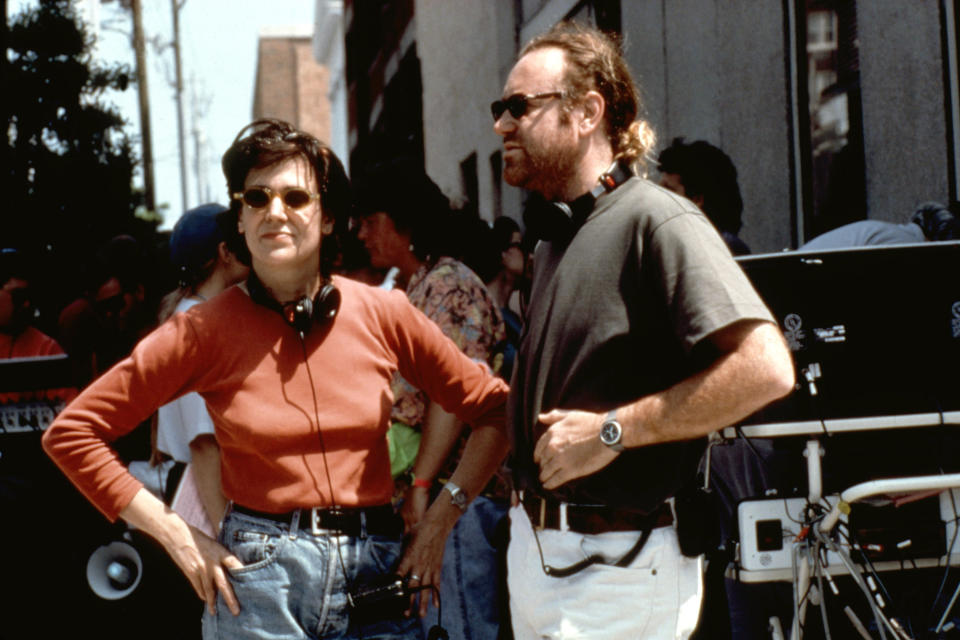
Allegedly, Morton decided an extra didn't look grimy enough for a scene they were shooting and poured coffee on them.
According to the Chicago Tribune, the cast and crew gave the directors a few derogatory nicknames — "Rockabell" and "Rocky and Annabel, the Flying Squirrel Show."
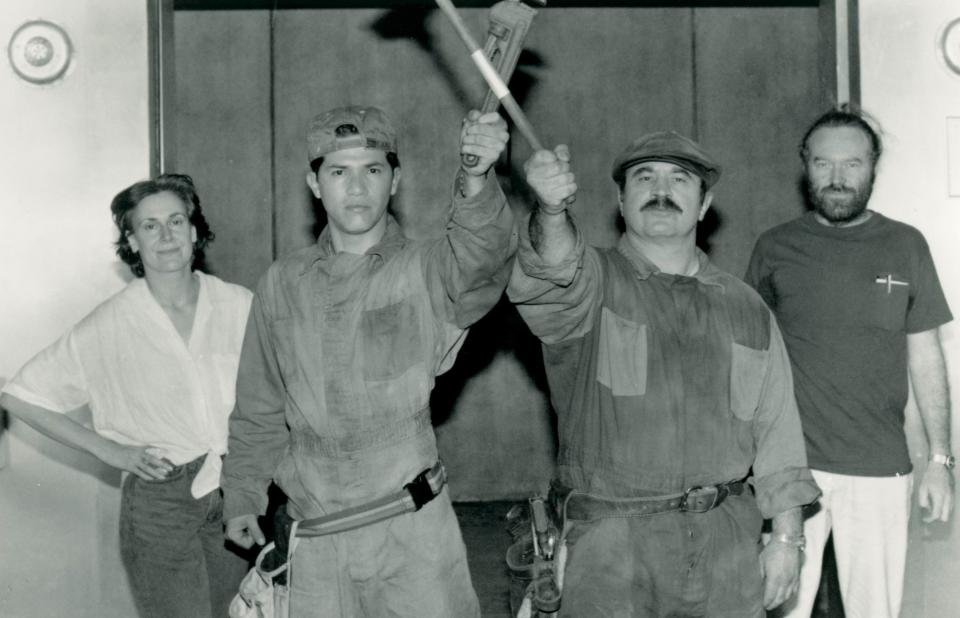
Actor Dennis Hopper said, "The directors won't give interviews? That's the smartest thing I've heard from them. That's the only intelligent thing I've heard that they've really actually done."
The actors who played Mario and Luigi — Bob Hoskins and John Leguizamo — did shots of scotch together between scenes. Reportedly, Leguizamo was drunk during a scene where he had to drive a van and braked too hard, which resulted in the sliding doors smashing Hoskins's hand.
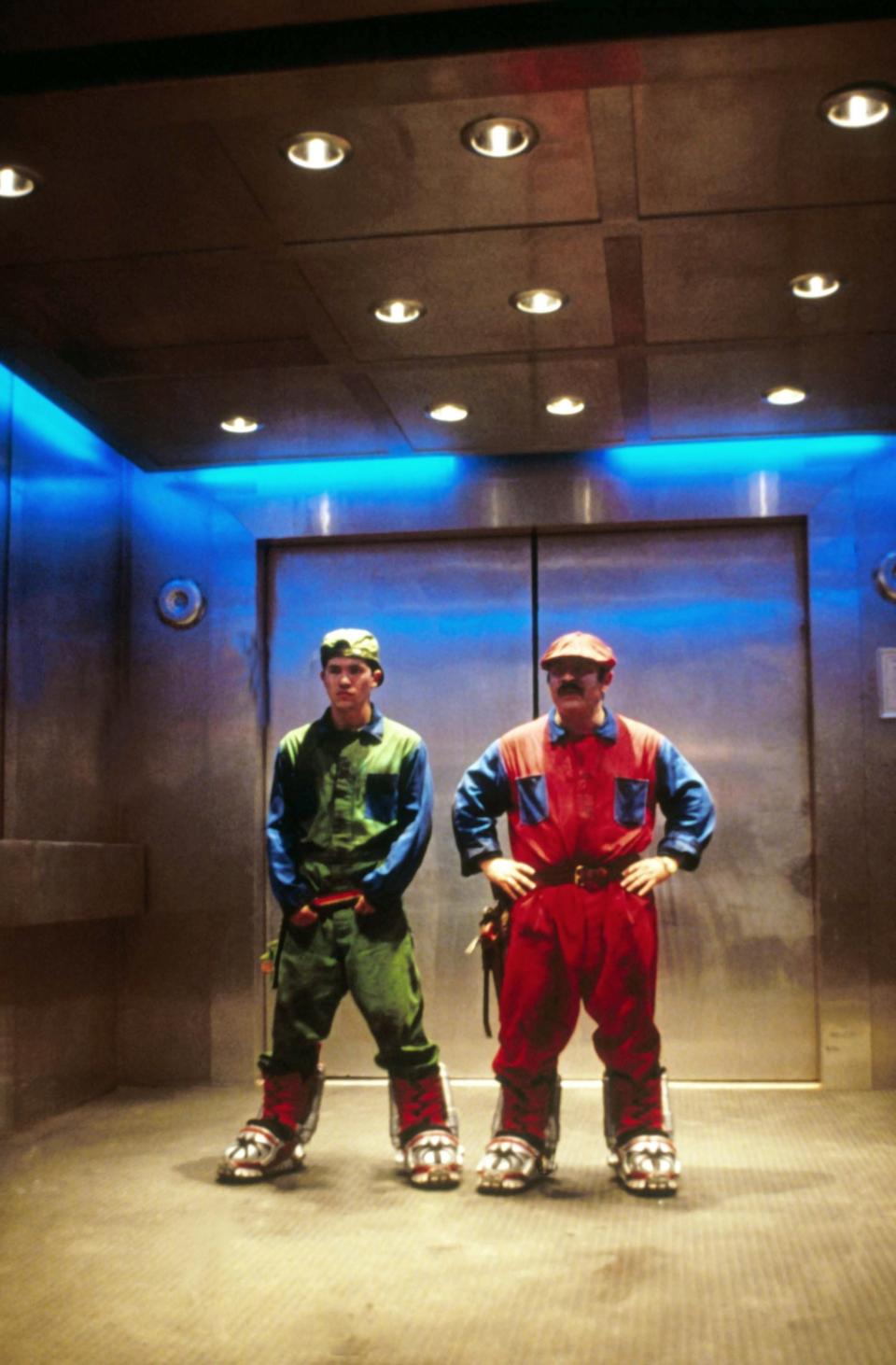
In 2007, Hoskins told the Guardian, "The worst thing I ever did? Super Mario Brothers. It was a fuckin' nightmare. The whole experience was a nightmare. It had a husband-and-wife team directing, whose arrogance had been mistaken for talent. After so many weeks their own agent told them to get off the set! Fuckin' nightmare. Fuckin' idiots."
After principle photography wrapped, the directors were shut out of additional filming and the editing room until Morton got the Director’s Guild of America union involved.
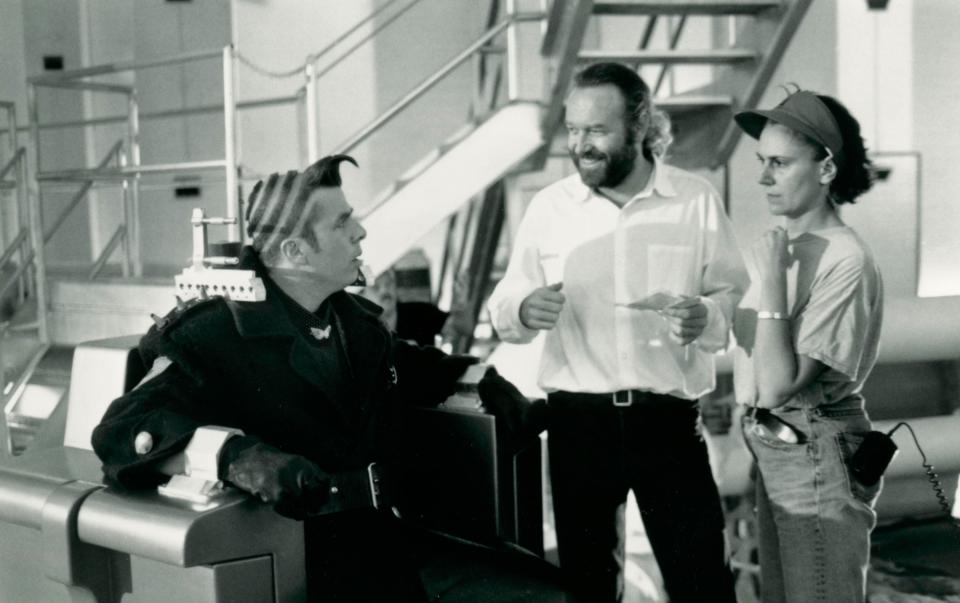
The resulting movie was a box office failure, grossing less than half of its production budget.
However, in 2013, it returned to theaters for a special 20th-anniversary release.
7.Mr. and Mrs. Smith (2005) is a rom-com/action movie about a husband and wife who discover they're assassins assigned to kill each other. However, it's more well-known for being the movie where Brad Pitt fell in love with costar Angelina Jolie while he was still married to Jennifer Aniston.
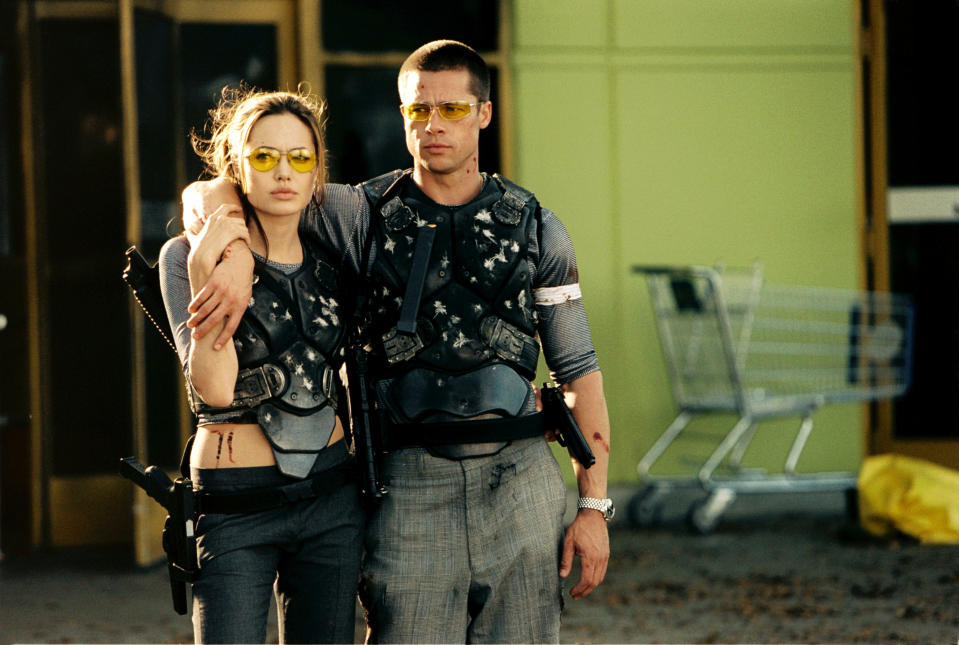
At the time, the press painted Jolie as a marriage-destroying "man eater." Though both she and Pitt denied having an affair, in 2008 she told the New York Times that she'd eventually show the movie to their children because "not a lot of people get to see a movie where their parents fell in love."
After meeting Jolie in the summer of 2004, Pitt separated from Aniston in January 2005. That March, Aniston officially filed for divorce, and Pitt and Jolie did a couple's photoshoot for W magazine, which came out that July.


James Devaney / WireImage / Via Getty, Jon Kopaloff / FilmMagic / Via Getty
The photoshoot— which was titled "Domestic Bliss" — surprised Aniston because the two hadn't confirmed they were in a relationship.
In the aftermath, Aniston was hounded by paparazzi, even at home. She was plagued by malicious — and often misogynist — rumors. She told Vanity Fair, "A man divorcing would never be accused of choosing career over children. That really pissed me off."
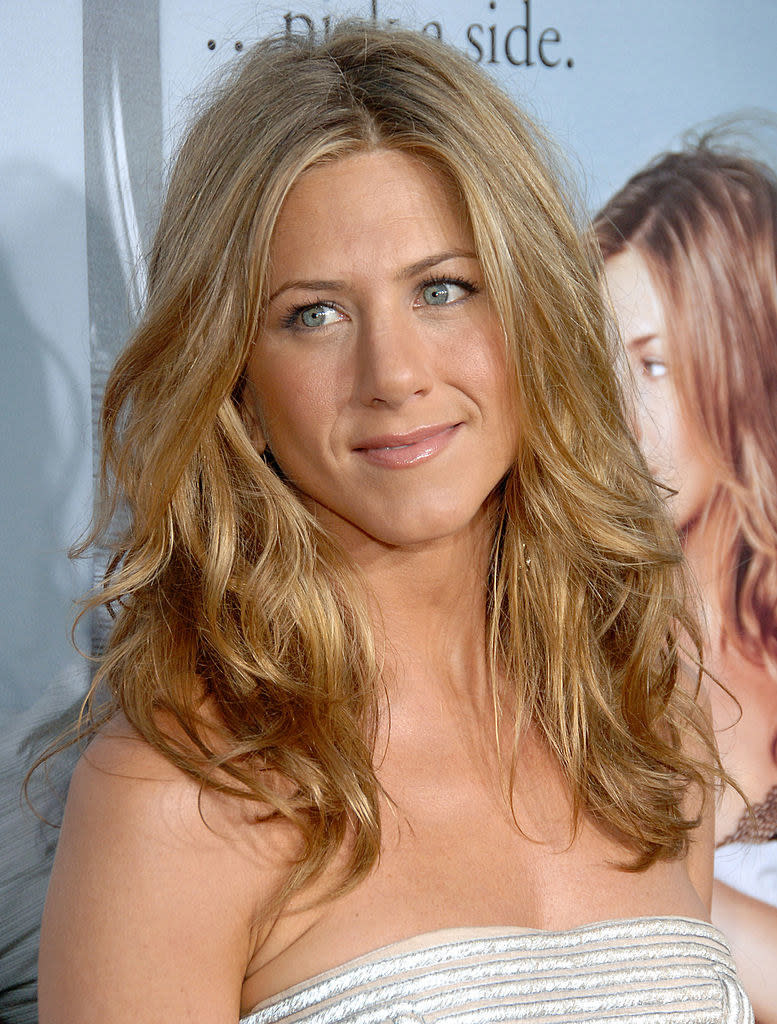
However, the court of public opinion also seemed to take her side. The same article reported that, at a local boutique, "Team Aniston" shirts wildly outsold "Team Jolie" shirts.
Aniston said, "It’s sad, something coming to an end. It cracks you open, in a way — cracks you open to feeling. When you try to avoid the pain, it creates greater pain. I’m a human being, having a human experience in front of the world. I wish it weren’t in front of the world. I try really hard to rise above it."
With friends like Courteney Cox by her side, she ignored the negative press. She chose to believe Brad's claim that he didn't cheat on her and that the timing of the W magazine photoshoot wasn't meant to be cruel.
Jolie and Pitt went on to raise six children together. They got married in 2014, but she filed for divorce in 2016 following allegations of domestic violence.
8.Snow White and the Huntsman (2012) is a retelling of the classic fairytale, but press coverage of the cheating scandal director Rupert Sanders had with lead actor, Kristen Stewart, overshadowed other buzz about the movie.
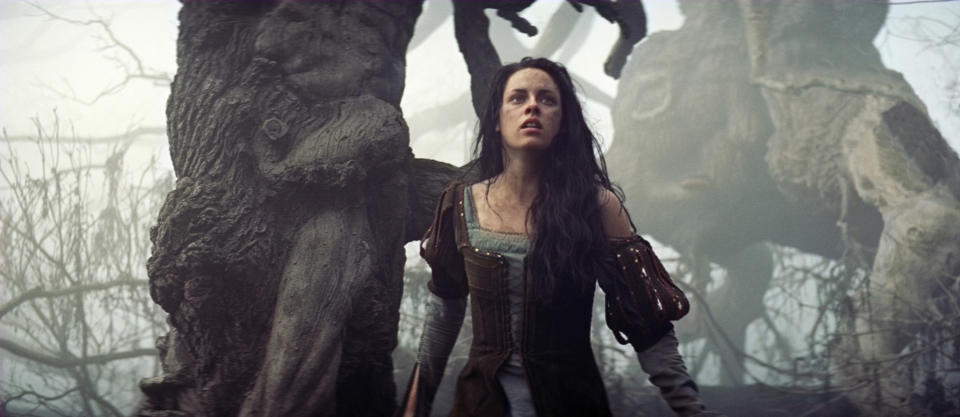
At the time, Sanders was married to model, Liberty Ross, and Stewart was in a relationship with her Twilight costar, Robert Pattinson.
Their relationship became public when US Weekly posted paparazzi pictures of them together. Both Sanders and Stewart released public apologies.

In a statement to US Weekly, Sanders said, "I am utterly distraught about the pain I have caused my family...My beautiful wife and heavenly children are all I have in this world. I love them with all my heart. I am praying we can get through this together."
In a statement to People, Stewart said, "I’m deeply sorry for the hurt and embarrassment I’ve caused to those close to me and everyone this has affected. This momentary indiscretion has jeopardized the most important thing in my life, the person I love and respect the most, Rob. I love him, I love him, I’m so sorry."
In the aftermath, Universal shelved the planned sequel and made a solo film for Chris Hemsworth's Huntsman instead. Neither Stewart nor Sanders was part of The Huntsman: Winter's War.
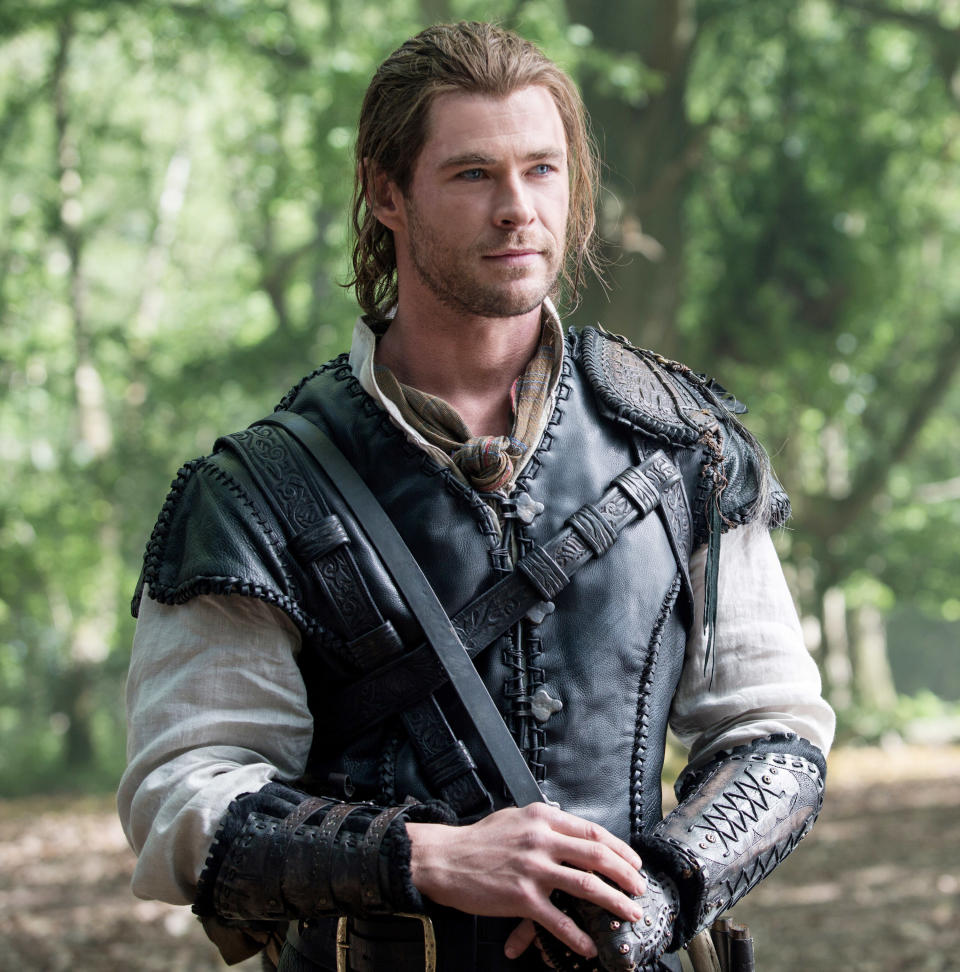
After the cheating scandal, Stewart and Pattinson briefly got back together before breaking up for good in 2013.
Ross filed for divorce from Sanders in 2013, which was finalized in 2014.
In 2019, Stewart told The Howard Stern Show that "the slut-shaming that went down was so absurd." She also said that, though she never actually slept with Sanders, she felt like she couldn't tell people because no one would believe her.

She also said the scandal was the reason she was dropped from the sequel. She said, "They didn’t put me in that movie because I went through such a highly publicized scandal, and so they were scared of touching that ... The work to me genuinely was ignored in a really sort of frivolous, silly, petty way for a group of adult people who were supposed to be running studios and making films. I think they’re idiots, because if you take a little risk and make something good, people will watch it and like it and pay you."
9.Blade: Trinity (2004) is the final installment in the trilogy centering on the Marvel superhero Blade. However, contention between lead actor Wesley Snipes, his costars, and director David S. Goyer made headlines.
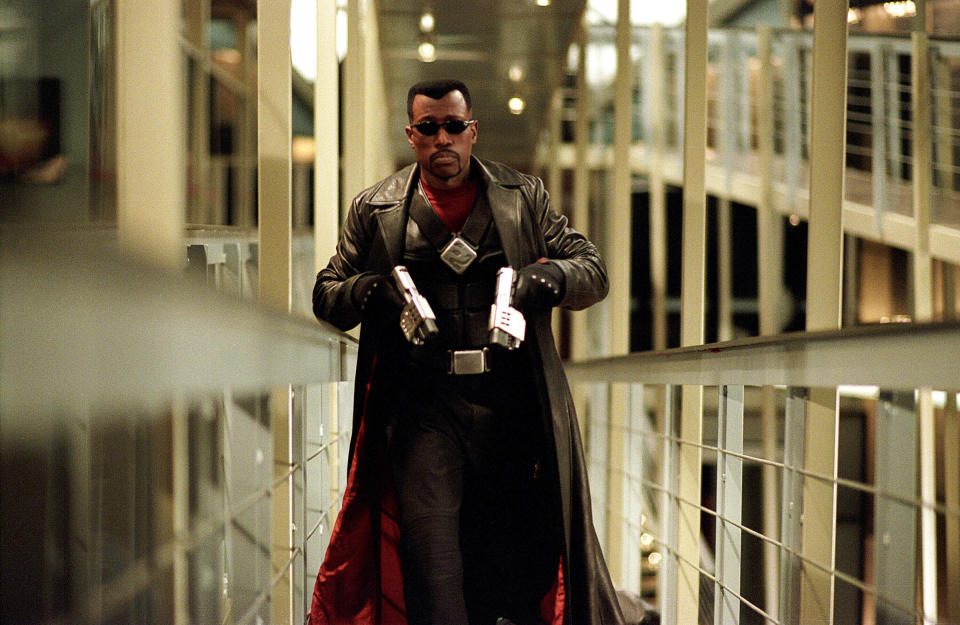
Patton Oswalt, who played Hedges, told the AV Club that it was "a very troubled production" and "Wesley [Snipes] was just fucking crazy in a hilarious way."
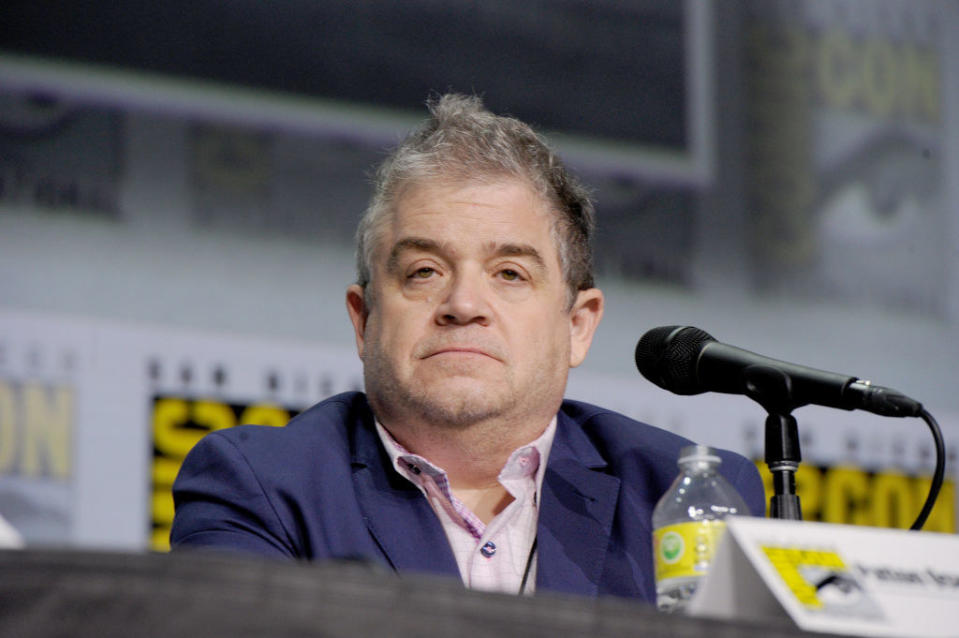
He alleged that Snipes stayed in his trailer most of the time, smoked weed all day, let his body double do everything but close-ups, and attempted to strangle the director.
Oswalt said, "We went out that night to some strip club, and we were all drinking. And there were a bunch of bikers there, so [director] David [S. Goyer] says to them, 'I’ll pay for all your drinks if you show up to set tomorrow and pretend to be my security.' Wesley freaked out and went back to his trailer. And the next day, Wesley sat down with David and was like, 'I think you need to quit. You’re detrimental to this movie.' And David was like, 'Why don’t you quit? We’ve got all your close-ups, and we could shoot the rest with your stand-in.' And that freaked Wesley out so much that, for the rest of the production, he would only communicate with the director through Post-it notes. And he would sign each Post-it note 'From Blade.'"
In 2020, Snipes denied attempting to strangle Goyer, telling the Guardian, "Let me tell you one thing. If I had tried to strangle David Goyer, you probably wouldn’t be talking to me now. A Black guy with muscles strangling the director of a movie is going to jail, I guarantee you."
He also denied the Post-it note story and mocked the idea of Oswalt being an "authority" on him. He said, "The presumption that one white guy can make a statement and that statement stands as true! Why would people believe his version is true? Because they are predisposed to believing the Black guy is always the problem. And all it takes is one person, Mr. Oswalt, who I really don’t know."
In 2016, Goyer told Uproxx, "That was the most personally and professionally difficult and painful thing I've ever been through."
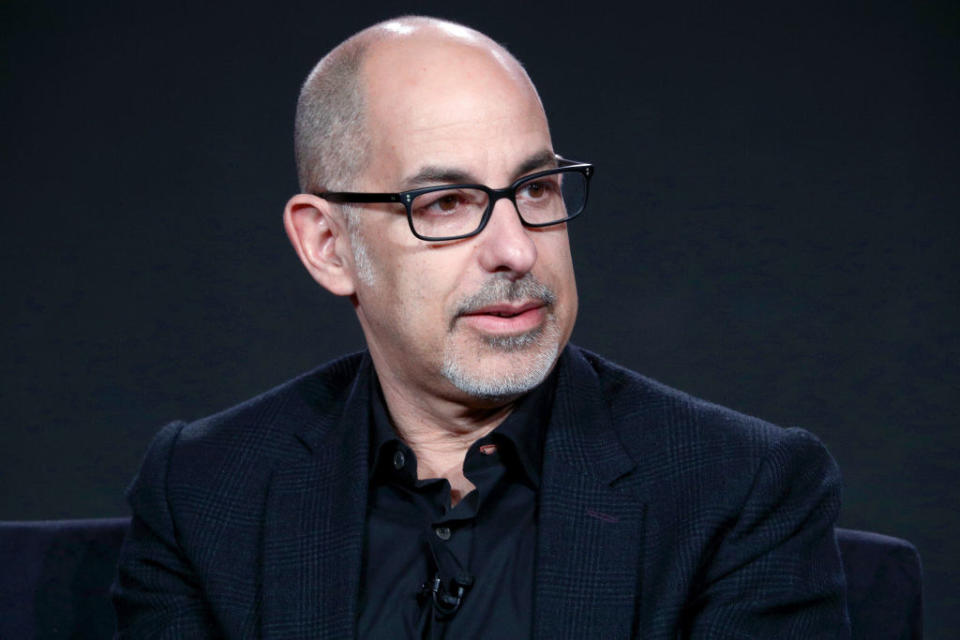
"Having said that, I have incredibly fond memories of working with Ryan [Reynolds] and Jessica [Biel] and a lot of people on the movie. Ryan and I remain really good friends today. It was a challenged shoot, as has been reported. What can I say?” he added.
He also said that he hasn't spoken to Snipes since the shoot.
In 2005, Snipes sued Goyer, executive producer Toby Emmerich, and New Line Cinema for $5 million, alleging that they violated his contract by forcing the supporting actors, director, and script on him. He also alleged that they still owed him a percentage of his fee and that he experienced racially motivated defamation and harassment.
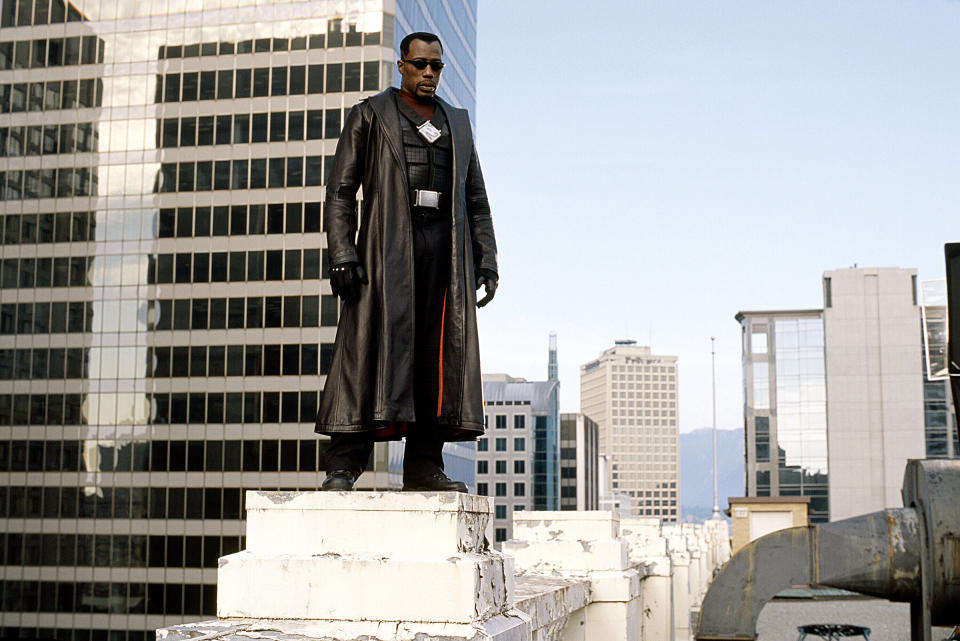
10.Justice League (2017) chronicled the team-up of several of DC's biggest superheroes after the death of Superman. However, a mid-production change in director, and accusations of misconduct, made for a bigger story.
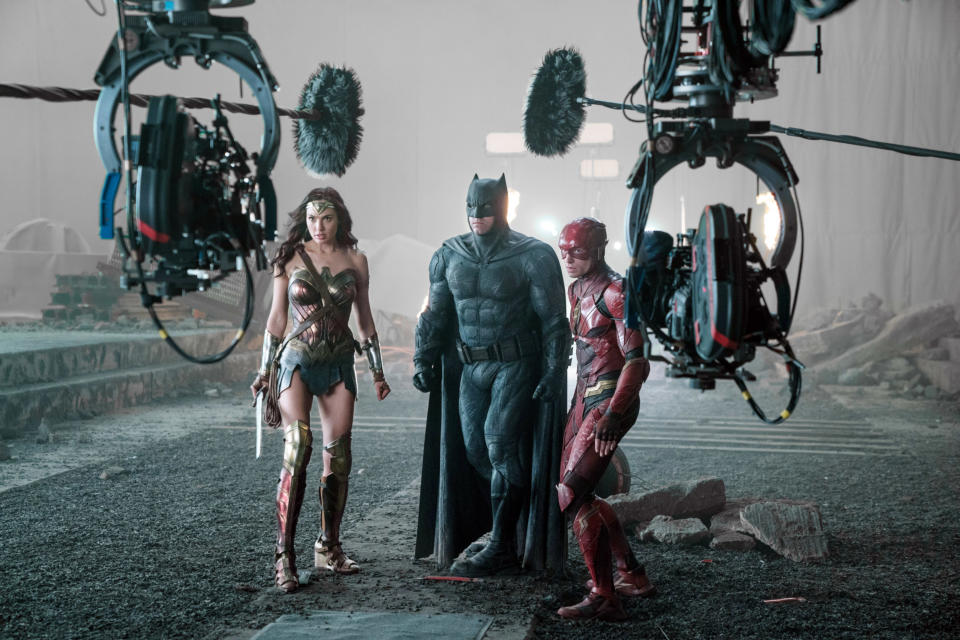
During post-production, director Zack Snyder stepped away to be with the family after his daughter died. Warner Bros. replaced him with Joss Whedon, whom Snyder had already brought on board to rewrite additional scenes.


Jon Kopaloff / FilmMagic / Via Getty, Michael Tullberg / Getty Images
At the Wonder Woman premiere, DCEU producer Charles Roven said, "It was fortunate that Zack convinced him, and he agreed to step in and finish the movie —- to help Zack finish his vision. We're excited about that."
However, in 2020, actor Ray Fisher, who played Cyborg, alleged on Twitter that the new director's "on-set treatment of the cast and crew of Justice League was gross, abusive, unprofessional, and completely unacceptable."
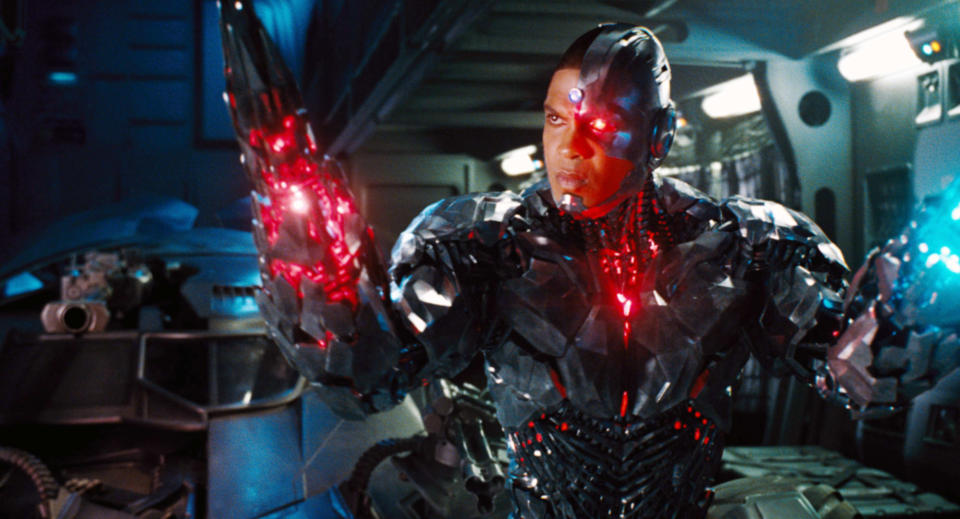
WarnerMedia conducted an investigation and carried out "remedial action" but declined to disclose the results of the investigation.
Former federal judge Katherine Forrest, who conducted the probe, told the Hollywood Reporter that she found there were "no credible support for claims of racial animus."
However, Fisher told THR that under Whedon, he felt it was his responsibility to "explain some of the most basic points of what would be offensive to the Black community."
He also alleged that when he tried to discuss his concerns with Whedon, the director told him, "It feels like I’m taking notes right now, and I don’t like taking notes from anybody — not even Robert Downey Jr."
Other sources told THR that the director butted heads with all of the lead actors, especially Gal Gadot, who played Wonder Woman. They alleged that "Joss was bragging that he’s had it out with Gal. He told her he’s the writer and she’s going to shut up and say the lines and he can make her look incredibly stupid in this movie."
Whedon's version of the film flopped at the box office, but in 2021, Warner Bros. released the Snyder Cut, which was declared a "hit" and a "global phenomenon."
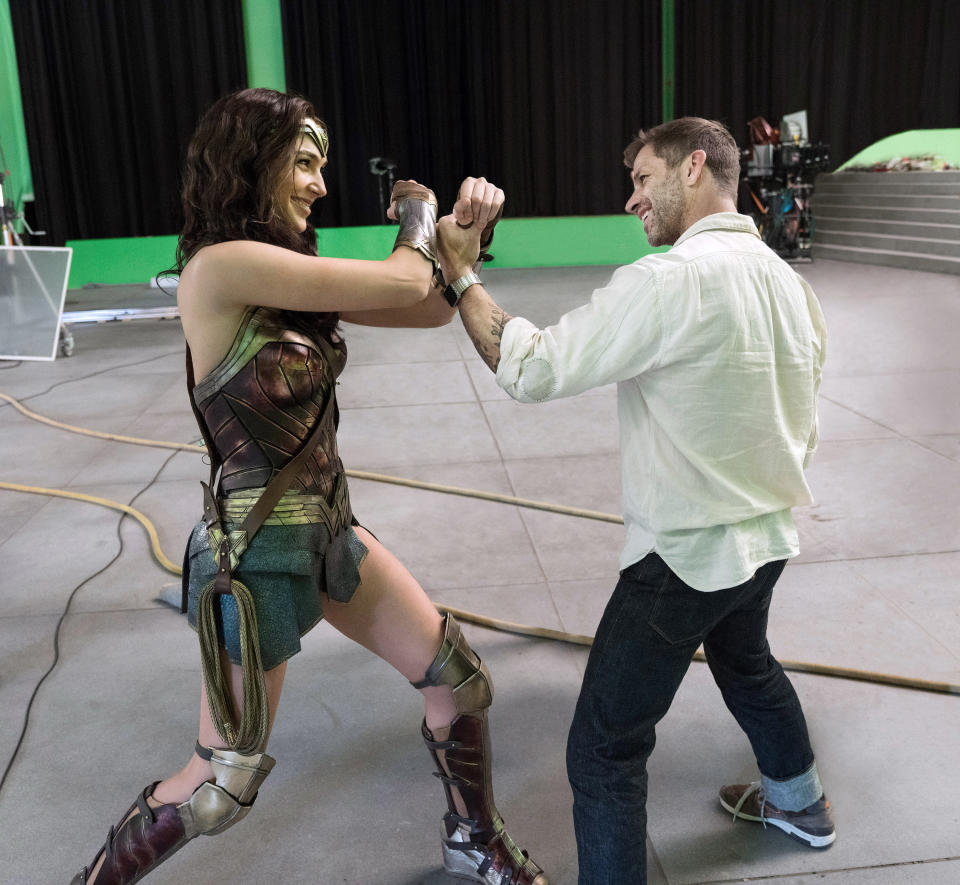
Snyder's version was also praised for being more inclusive than Whedon's version.
11.Roar (1981) is an adventure comedy about a naturalist and his family going up against wild animals. The production is known for being one of the most dangerous movies ever made after the director and his entire family were injured by wild animals.
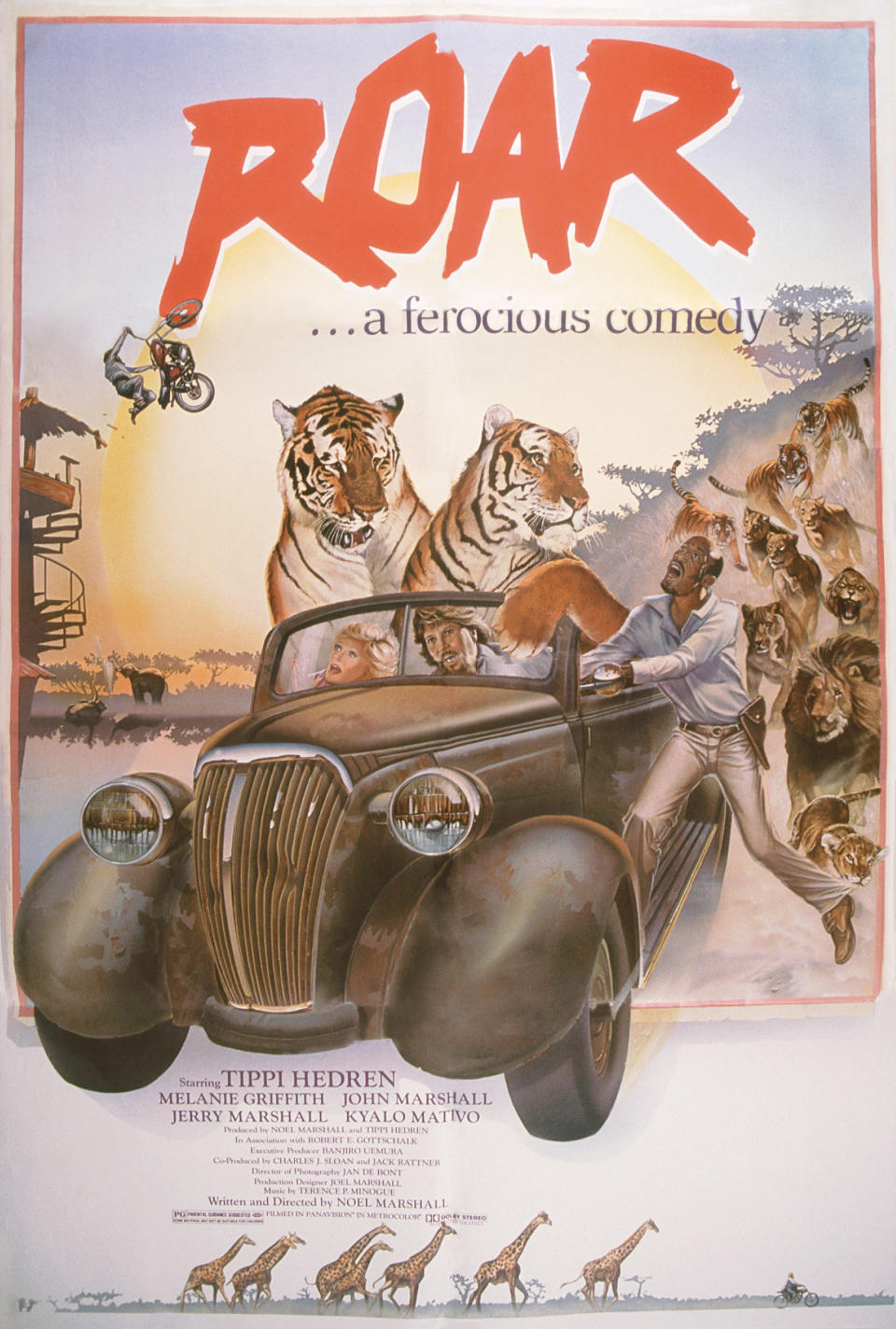
After testing the premise of the movie by bringing lions into their own home, writer/director Noel Marshall and his wife, actor Tippi Hedren, cast themselves and their children in the lead roles.
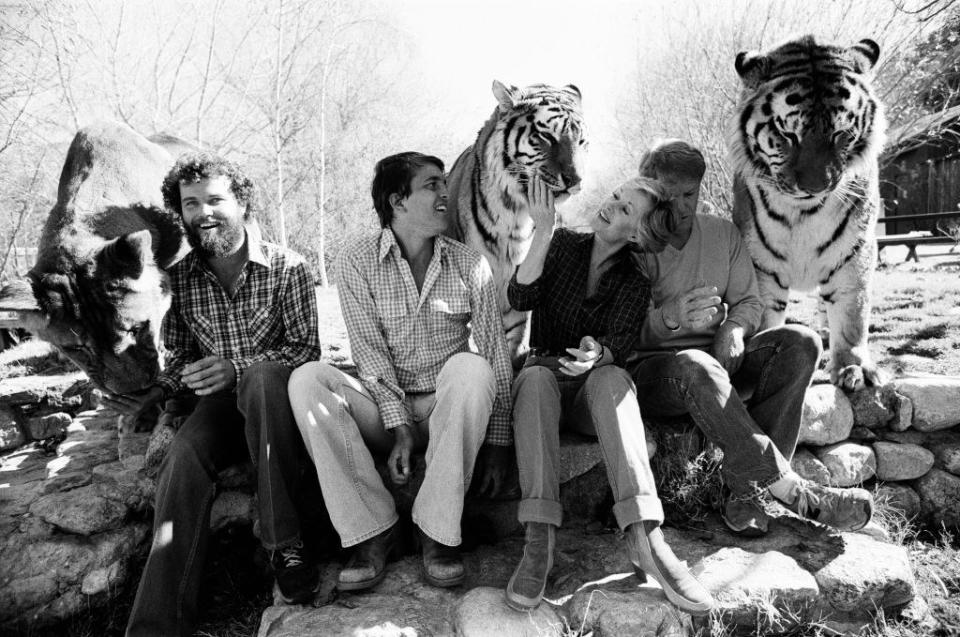
Marshall only took on the male lead because they couldn't find another actor willing to have such close contact with the animals.
In her autobiography, Hedren wrote that the cast included "132 big cats, one elephant, three aoudad sheep, and a collection of ostriches, flamingos, marabou, storks, and black swans."
The cast suffered injuries both on camera and behind the scenes. Marshall endured blood poisoning. Hedren required skin grafts and treatment for gangrene. Her daughter, Melanie Griffith, had to get cosmetic surgery after an animal mauled her face near her eye.
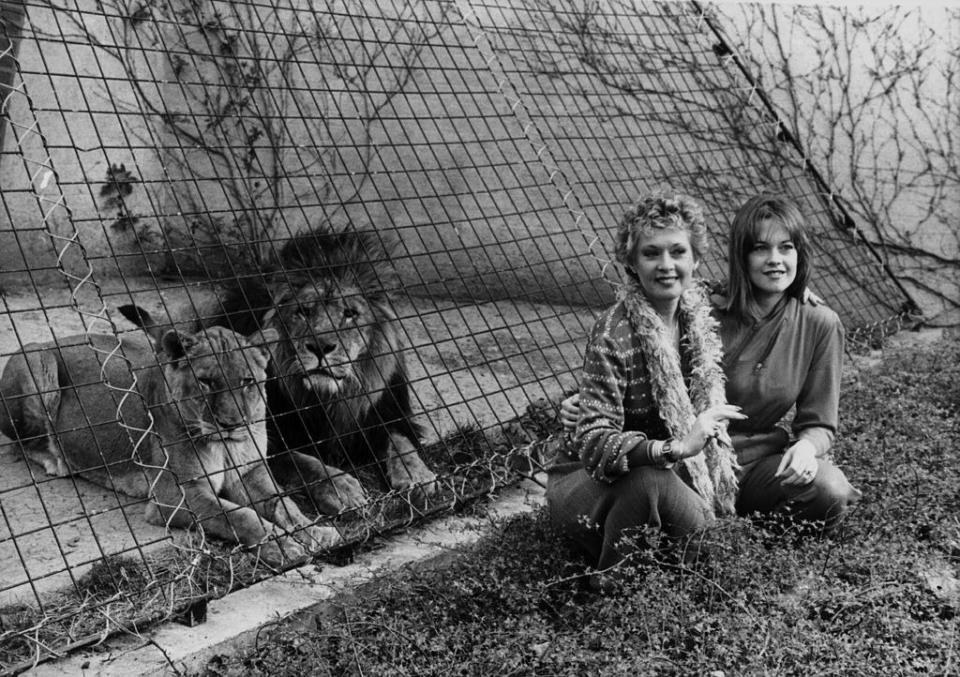
The crew was also in danger. Cinematographer Jan de Bont's scalp was ripped off and had to be reattached with 120 stitches.
John Marshall told the NY Post, "Dad was a f–king a–hole to do that to his family."
The movie was in production for 11 years and then received an international release. However, it wasn't released in the US until 2015, when Drafthouse Films added the tagline "most dangerous film ever made."
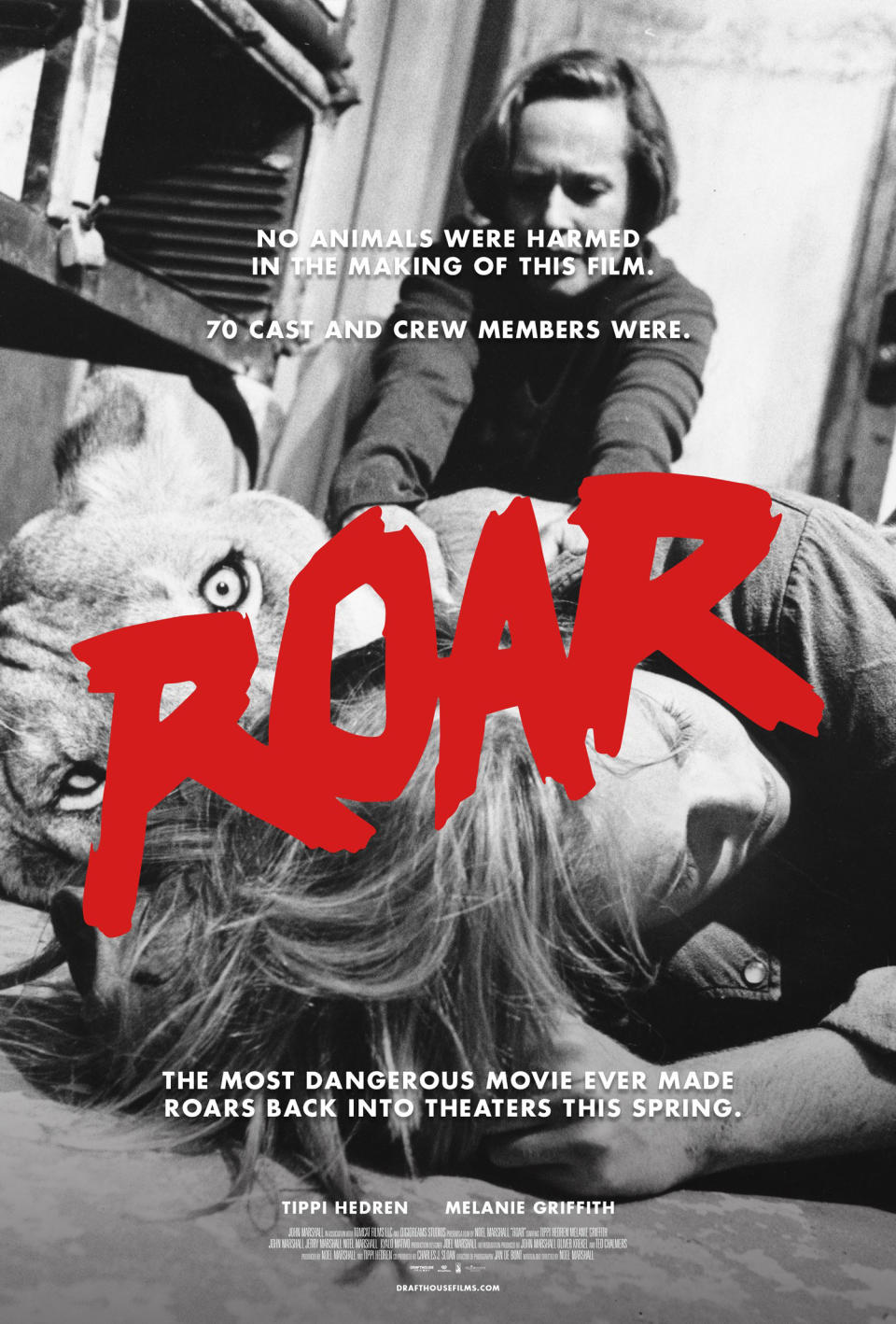
In 1971, Hedren opened Shambala, an animal sanctuary north of Los Angeles. Marshall continued to provide financial support for the ranch after their divorce.
In 1983, she launched the Roar Foundation to provide for the care of the Shambala animals.
She told the Los Angeles Times, "People sometimes say to me that if it weren’t for the lions, Noel and I would still be together...I can’t say, but the accidents, the floods — these things didn’t happen every day. During the actual filming, there were 140 people around the lions and tigers every day. It’s amazing we didn’t have more accidents. We learned so much from that time. That’s what keeps us safe now."
12.Whatever Happened to Baby Jane? (1962) is a psychological horror thriller about a failed child actor who antagonizes her movie star sister. However, the decades-long feud between lead actors Bette Davis and Joan Crawford gave the film most of its buzz.
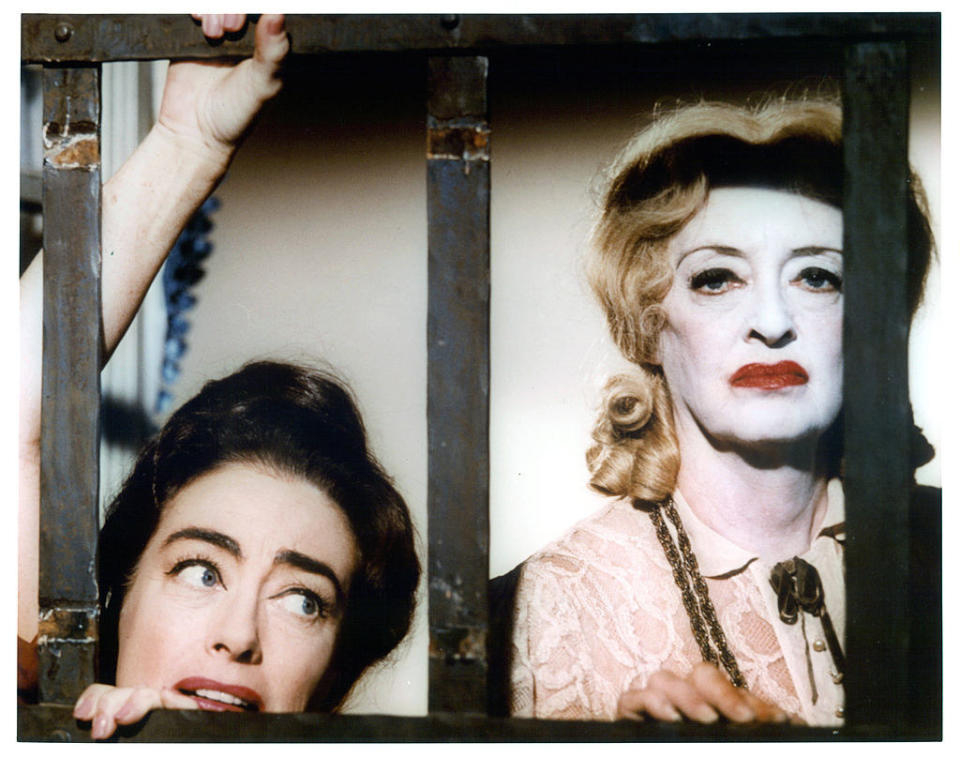
Their feud began in 1933 when news of Crawford's divorce overshadowed publicity for Davis's film, Ex-Lady, in the papers.


Sunset Boulevard / Corbis via Getty Images, Lmpc / LMPC via Getty Images
Movie theaters dropped Ex-Lady after a week because of poor ticket sales.
Two years later, Davis fell in love with her Dangerous costar, Franchot Tone, on set, but he announced his engagement to Crawford during filming.
The role earned Davis an Oscars nomination for Best Actress, but she wore a plain dress to the awards show because she didn't expect to win. However, after she accepted the award, Crawford ignored her until Tone called her out on it. Then, she reportedly said, "Dear Bette! What a lovely frock."
Despite Crawford's attempts at ending their beef, the rivalry continued. There were also rumors that Crawford was in love with Davis, which Davis reportedly believed to be true.
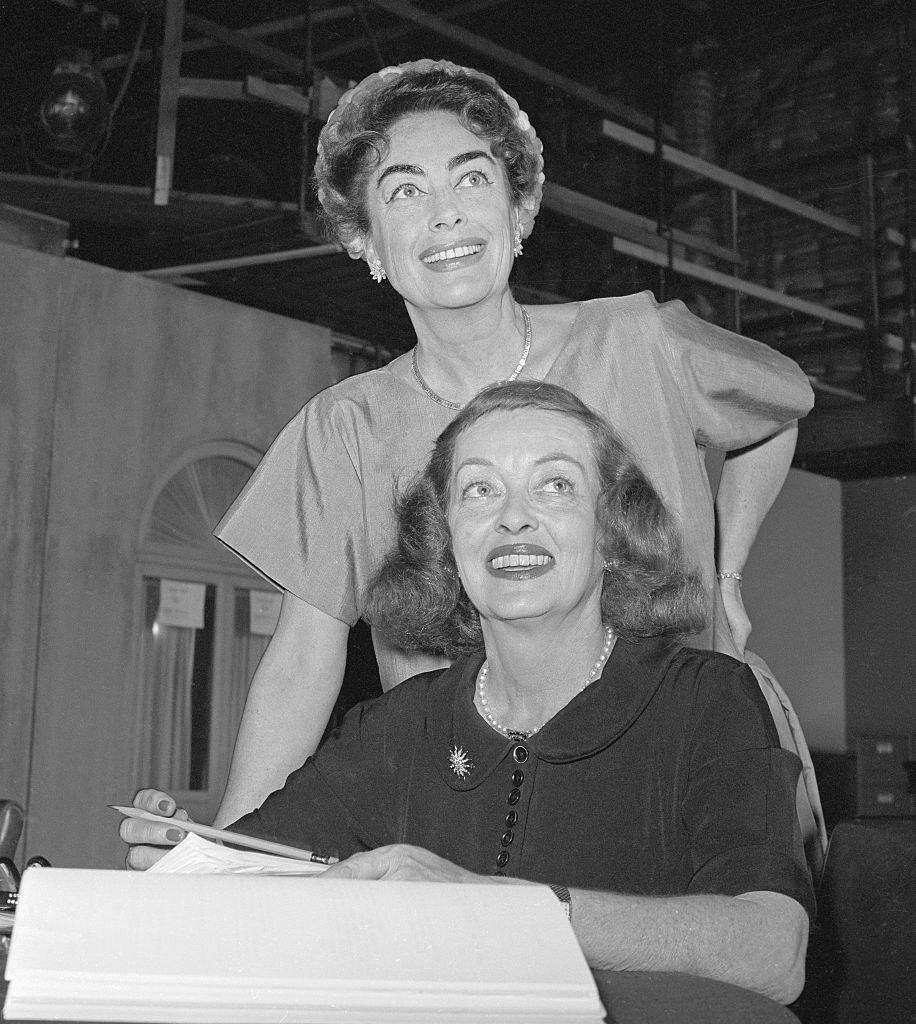
In 1952, Crawford's ex-friend Katherine Albert wrote The Star to mock her and cast Davis as the lead.
In 1962, Davis took the role in Baby Jane under two conditions, (1) she got to play Baby Jane, and (2) the director had to assure her he wasn't sleeping with Crawford. The women's rivalry made for a contentious and dangerous environment on set.
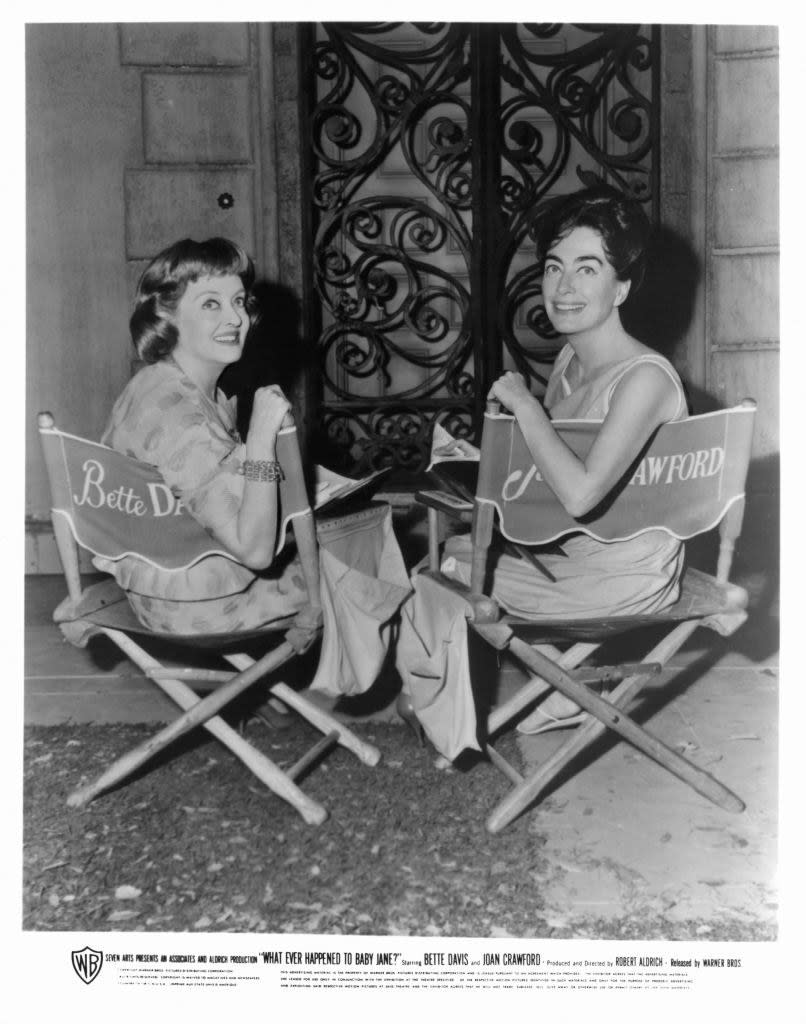
It started off as petty. At the time, Crawford served on Pepsi's board of directors, so Davis arranged for a Coke machine to be installed in her dressing room.
However, things escalated quickly. Crawford didn't trust Davis not to injure her, so she required a body double. While filming a close-up, she wasn't able to have the body double, and Davis reportedly hit her so hard in the head that she had to get stitches.
Crawford also got physical, purposefully weighing herself down with rocks and a weightlifter's belt for a scene where Davis had to drag her because she knew her rival had back issues.
The feud continued into awards season when Davis was nominated for Best Actress at the Oscars but Crawford wasn't. In retaliation, Crawford volunteered to accept the award on behalf of any other nominees who couldn't make the ceremony. Anne Bancroft won but wasn't able to attend, so Crawford accepted the Oscar and posed with the other winners.
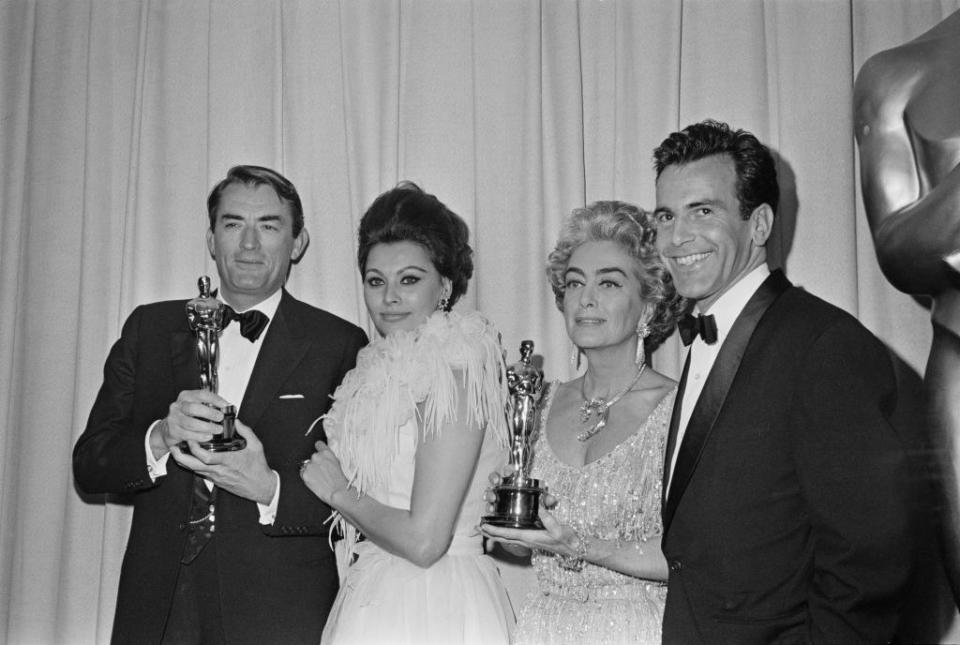
Warner Bros. tried to cast Crawford and Davis in another movie together, but less than two weeks into filming, Crawford dropped out.
Their feud inspired the FX miniseries Feud: Bette and Joan.
13.Escape from Tomorrow (2013) is an independent horror movie about the bizarre hallucinations and experiences of a dad who's fired on the last day of his family's Walt Disney World vacation. The production is notorious for using guerrilla filmmaking techniques to film at Disney World and Disneyland without permission.
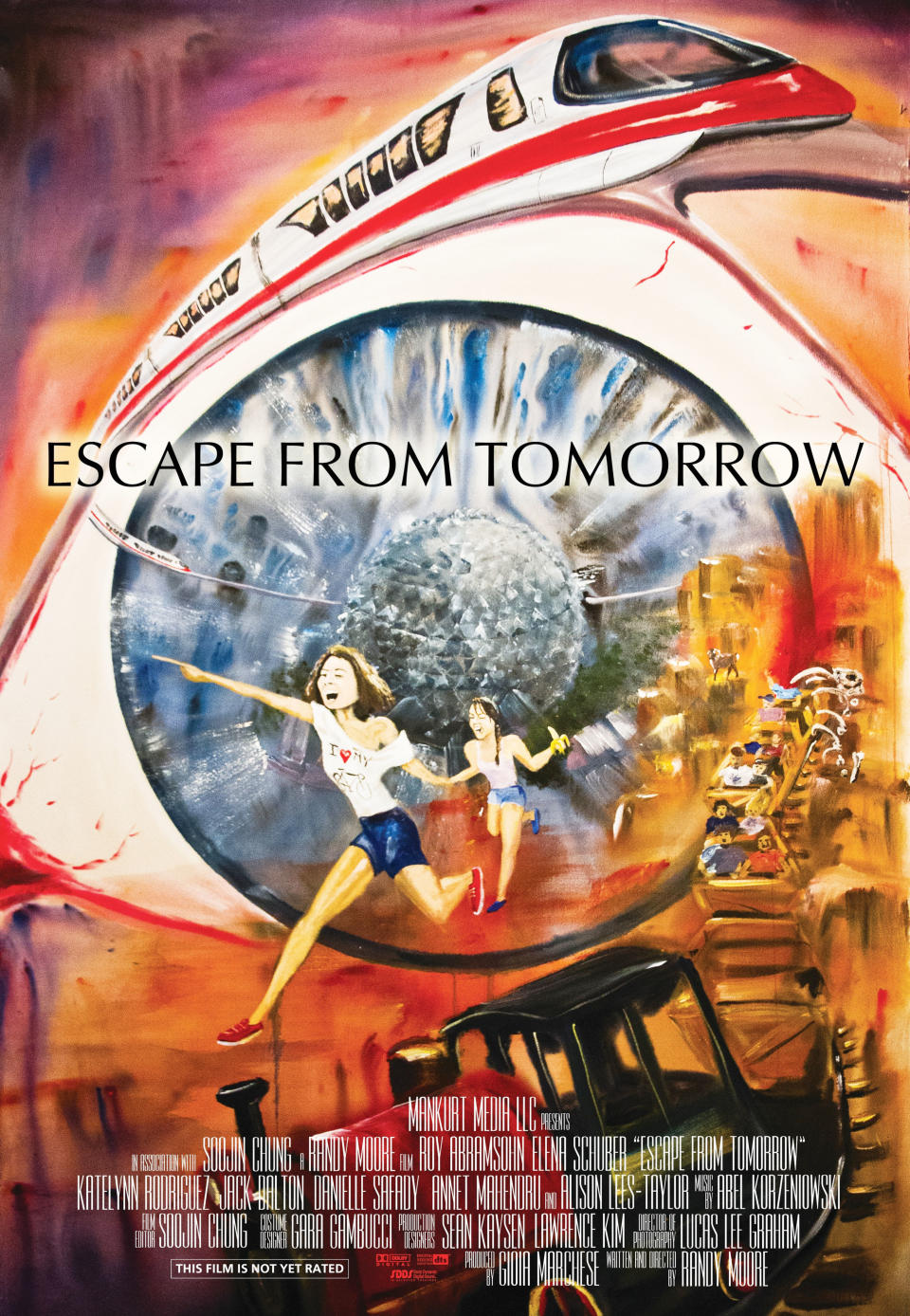
The movie seemed like a copyright lawsuit waiting to happen because it depicted Disney parks characters as prostitutes and child murderers. Other plot points suggested that the giant turkey legs were actually emu meat and involved several attractions in a harrowing conspiracy.
During production, writer/director Randy Moore was so anxious about getting caught that he lost 47 pounds.

He also made his entire cast and crew leave the park after a near-miss with security when they spent three and a half hours on the same attraction.
Despite rumors that the movie was edited in South Korea to obscure it from Disney's radar, only the visual effects were completed abroad. It premiered at Sundance.
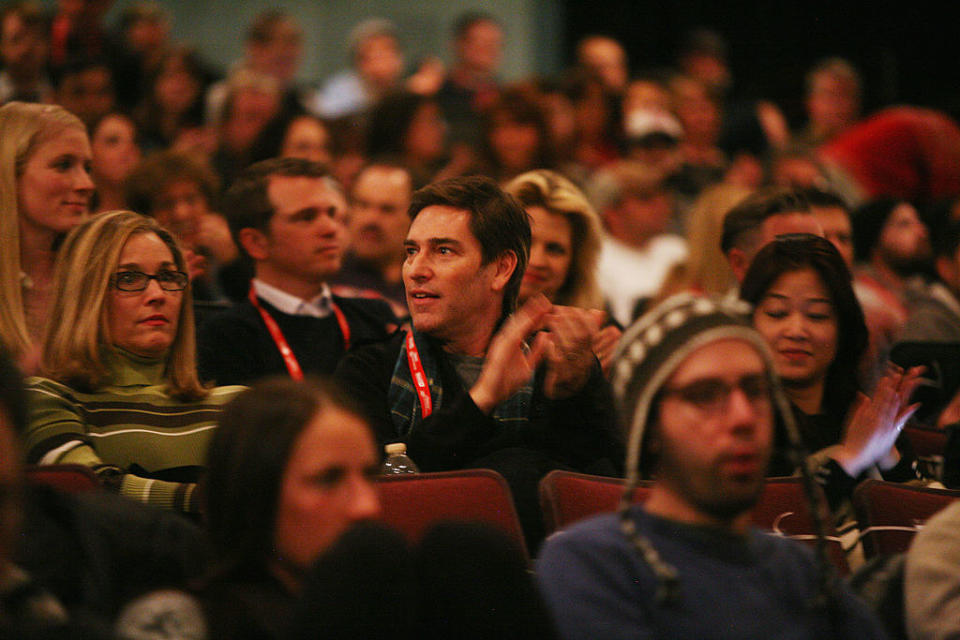
After attending the screening, Columbia Law School professor, Tim Wu, wrote a New Yorker article about why he believed the film didn't violate copyright laws. He wrote, "As commentary on the social ideals of Disney World, it seems to clearly fall within a well-recognized category of fair use, and therefore probably will not be stopped by a court using copyright or trademark laws...The film isn’t so much a criticism of Disney World itself but of the unattainable family perfection promised by a day spent at the park."
Ultimately, Disney declined to comment about the movie and chose to ignore it, a strategy that reportedly served to not draw any further attention to the production or give it free publicity.

After surveying studio marketing executives, the Hollywood Reporter came to the conclusion that the Walt Disney Company's silence hurt the film more than taking legal action — which would've brought more attention to it.
However, Escape from Tomorrow is mentioned in D23's official "Disney A-Z" catalogue, which describes it as "an independent surrealistic cult film surreptitiously filmed at Walt Disney World and Disneyland."
14.Pulgasari (1985) is a Godzilla-inspired dark fantasy. It was only made because North Korean leader Kim Jong-il kidnapped notorious South Korean director Shin Sang-ok and his wife, actor Choi Eun-hee — but its success led to their escape.
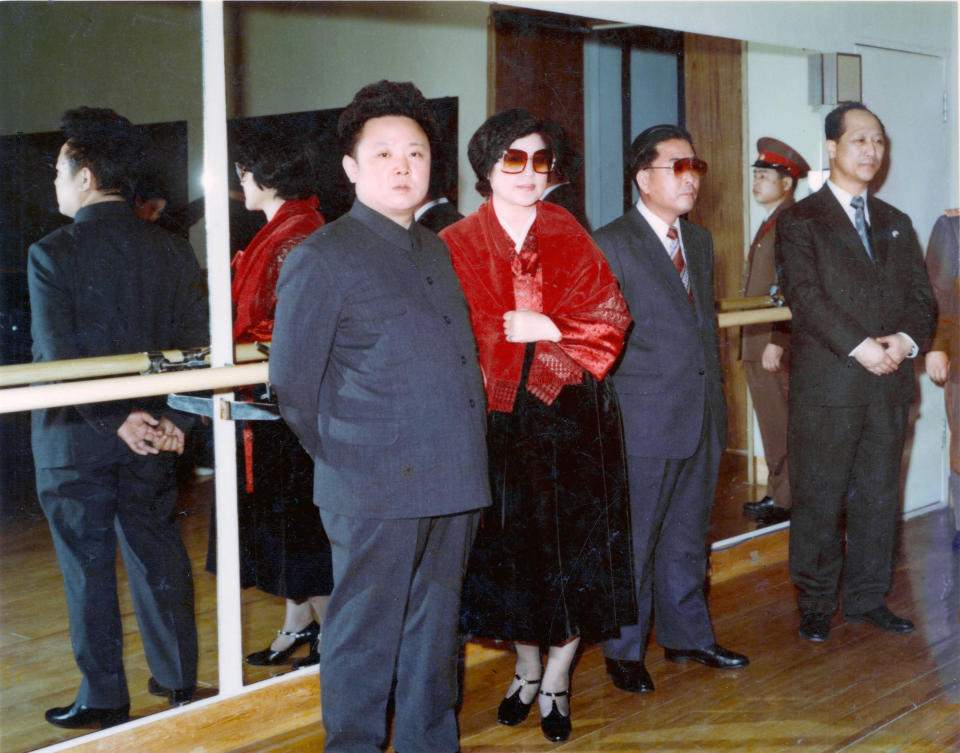
Shin told the Guardian, "I hated communism, but I had to pretend to be devoted to it, to escape from this barren republic. It was lunacy."
In his memoir, Kingdom of Kim, Shin said that the dictator forced him to make the movie as propaganda for the Korean Workers' Party.

He also said that, after being caught during an attempted escape, he was sentenced to four years in a prison camp. After his release, he was reunited with Choi at a reception Kim threw. There, they discovered the reason behind their kidnapping and then began making the propaganda films.
They completed seven movies before successfully escaping to Vienna. The key to their freedom was a secret recording Choi made during their initial meeting with Kim, which was leaked and broadcast in South Korea.
After the success of Pulgasari, Shin and Choi were allowed to travel to Austria to meet with a film distributor. After landing in Vienna, they never returned to North Korea.
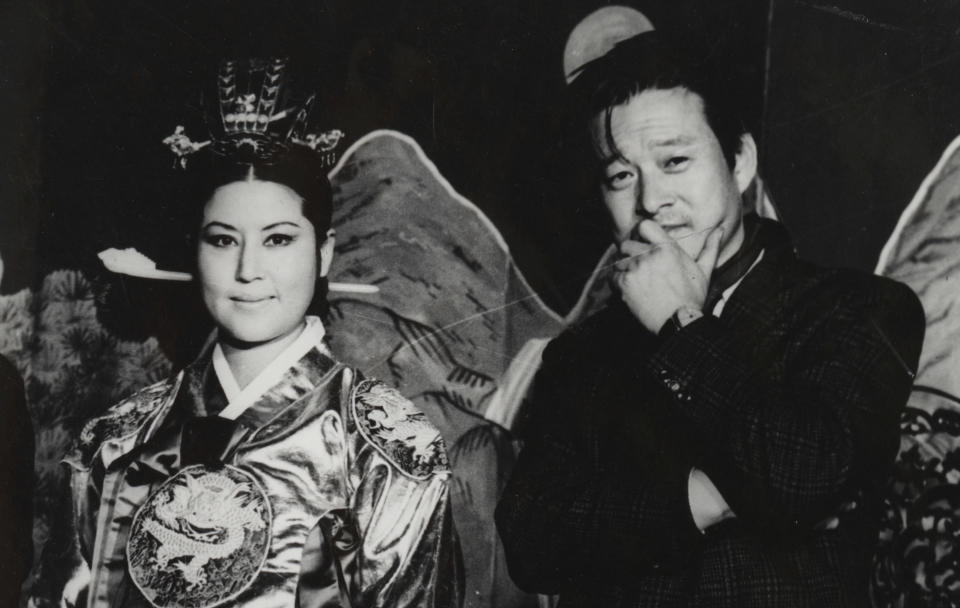
They met with a movie critic friend from Japan for lunch, who helped them get in a taxi to the American embassy.
In 2001, the American anime distribution company, ADV Films, released Pulgasari on VHS. Since then, the movie has been shown in multiple indie theaters across the world.
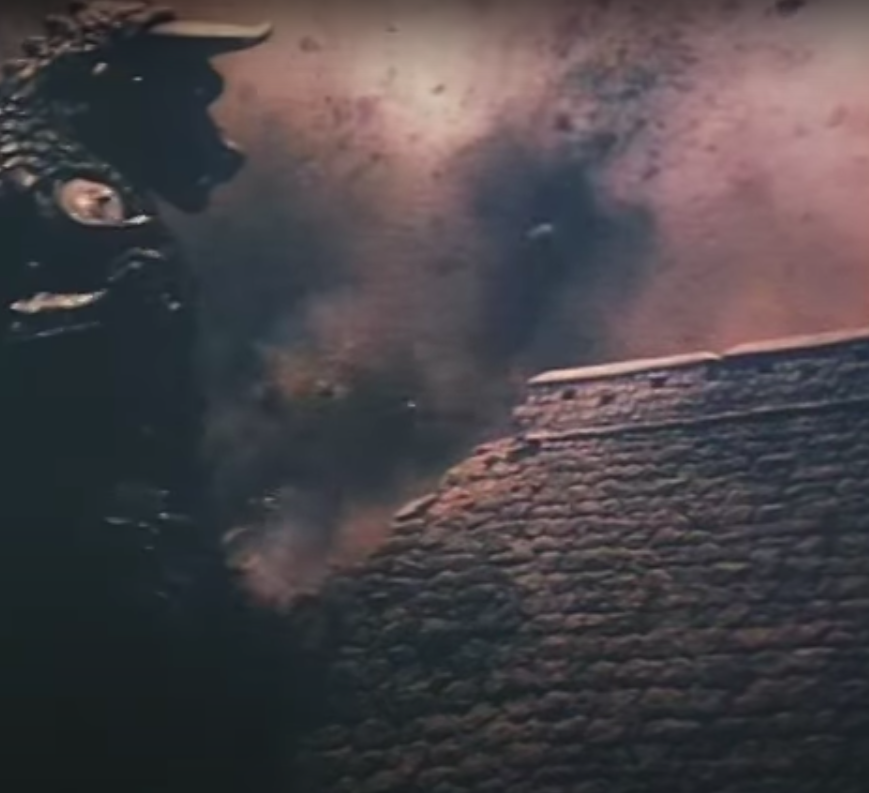
15.Heart of Glass (1976) is about a 1700s Bavarian town where everyone descends into madness after the knowledge of how to produce ruby glass dies with the master glass blower. However, the film is more well-known for the fact that filmmaker Werner Herzog hypnotized the entire cast.
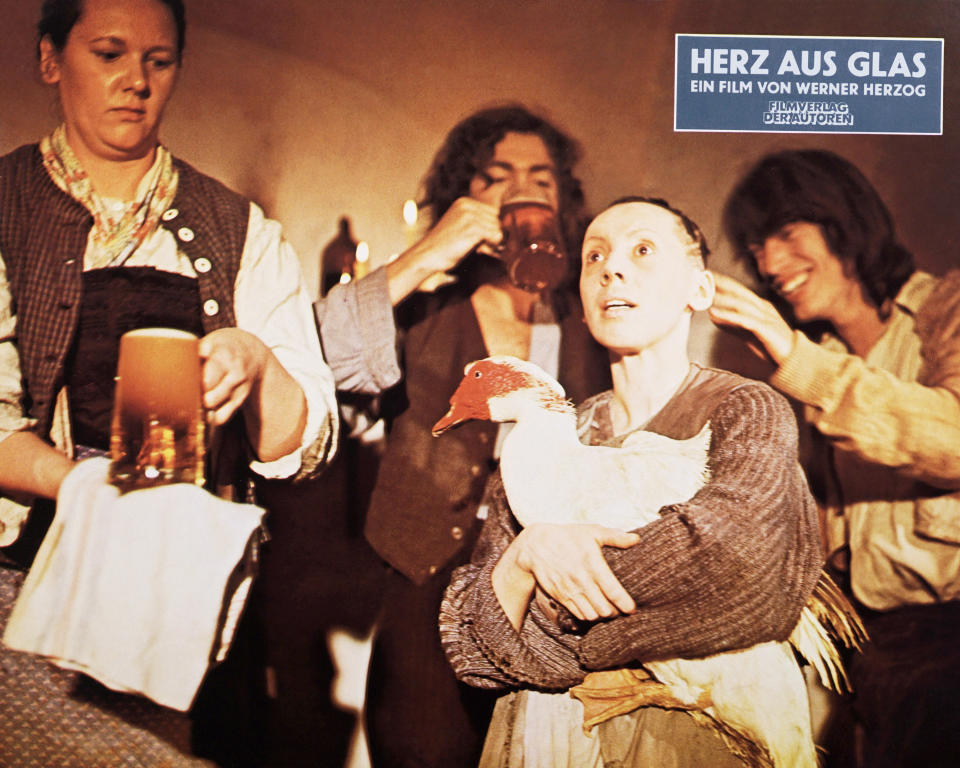
Herzog claims he used hypnosis for stylization, not control.
According to Filmmaker Magazine, he told his mentee Alan Greenberg, "This will be done for reasons of stylization and not for reasons of total manipulation...this use of hypnosis could give us access to our inner state of mind, starting from a new perspective."
Herzog hired a professional hypnotist, but he fired them for touting "new age bullshit." So, he decided to hypnotize the cast — many of whom were non-actors — himself.
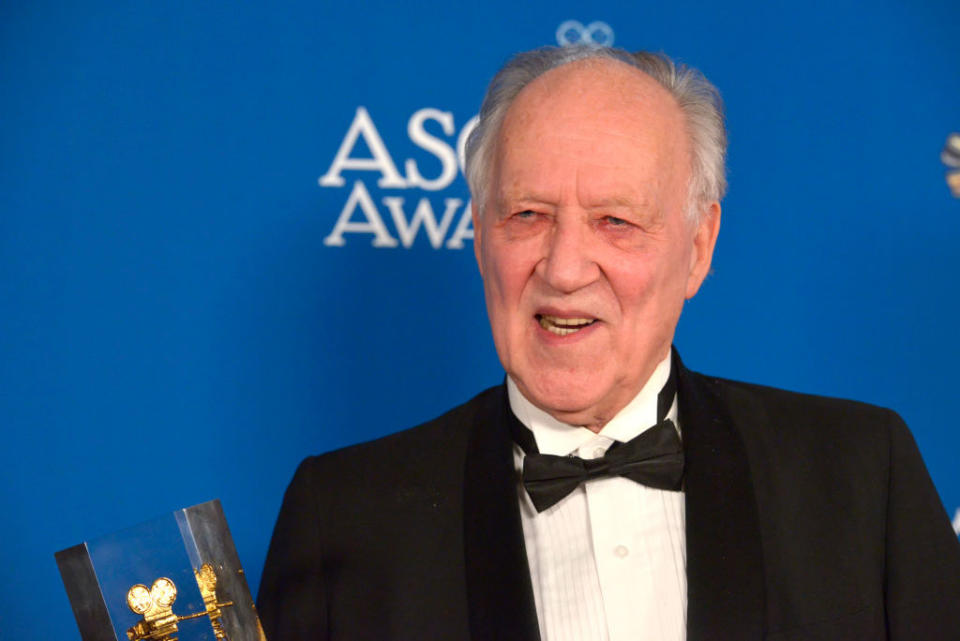
After the actors were successfully hypnotized, he'd get them to memorize their lines. Then, they filmed each scene quickly, using a maximum of two takes. He let the actors improvise rather than giving a lot of direction.
Greenberg told Filmmaker Magazine, "In two minutes, all four farmers were deeply hypnotized. Recognizing this, Herzog gave them their acting directions. He told them that they stood on heavenly ground, but when they opened their eyes they would see a land troubled by terrible giants. They would be so frightened, he went on, that their lips would twitter and their limbs would shake. But he assured them that no matter how fearsome things might seem, they would be quite safe and well protected and could speak their lines with no trouble whatsoever."
As a result, the actors' performance seemed almost as if they were sleepwalking. Both their timing and eye contact were off. Only Josef Bierbichler, the lead actor who played a seer, remained un-hypnotized.
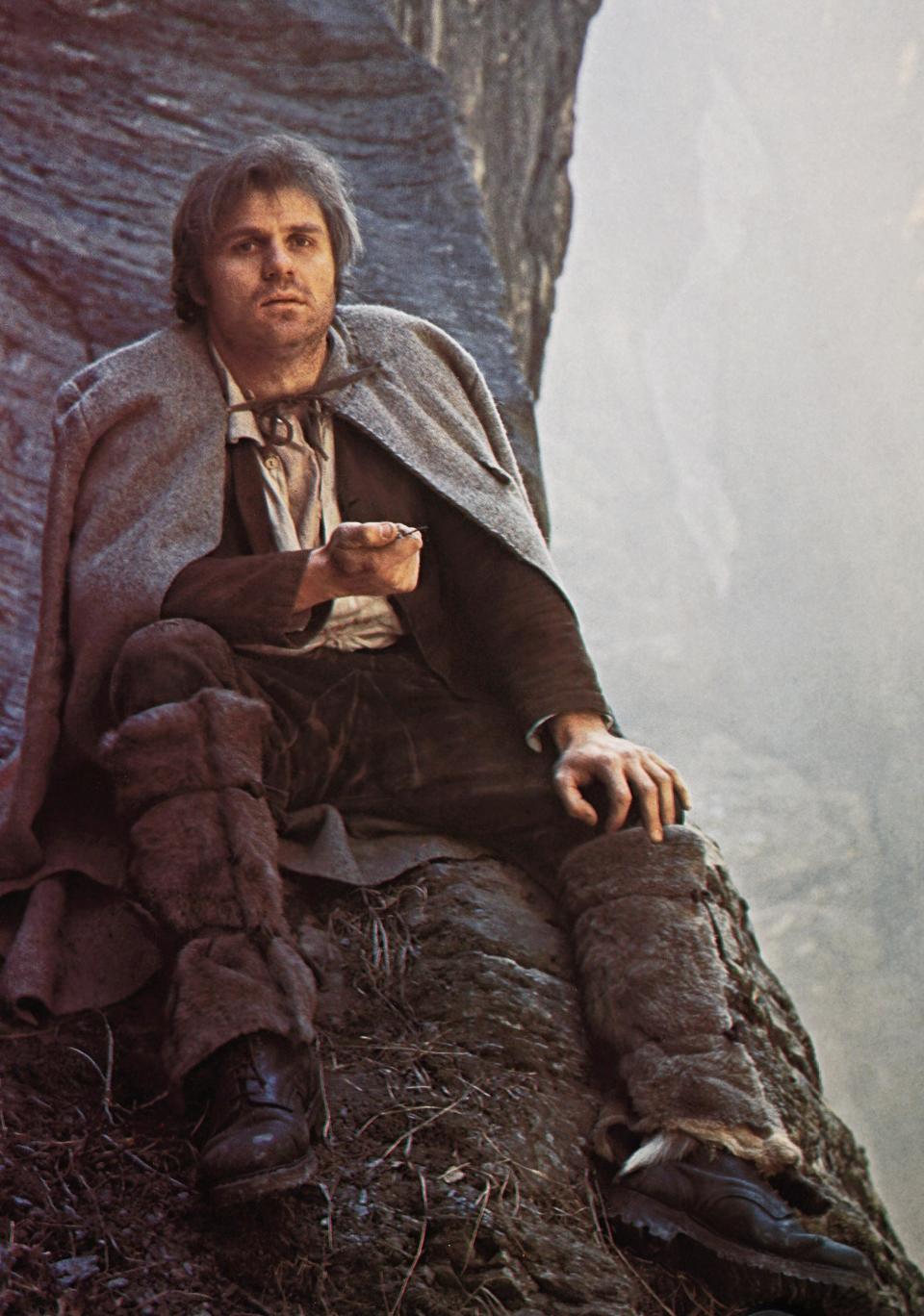
Greenberg wrote the book Every Night the Trees Disappear about his experience on set with Herzog.
16.And finally, The Room (2003) is a drama about a love triangle between a banker, his fiancée, and his best friend, but it's more well-known for being such a terrible movie that it gained a cult following and inspired a memoir and another movie, both called The Disaster Artist.
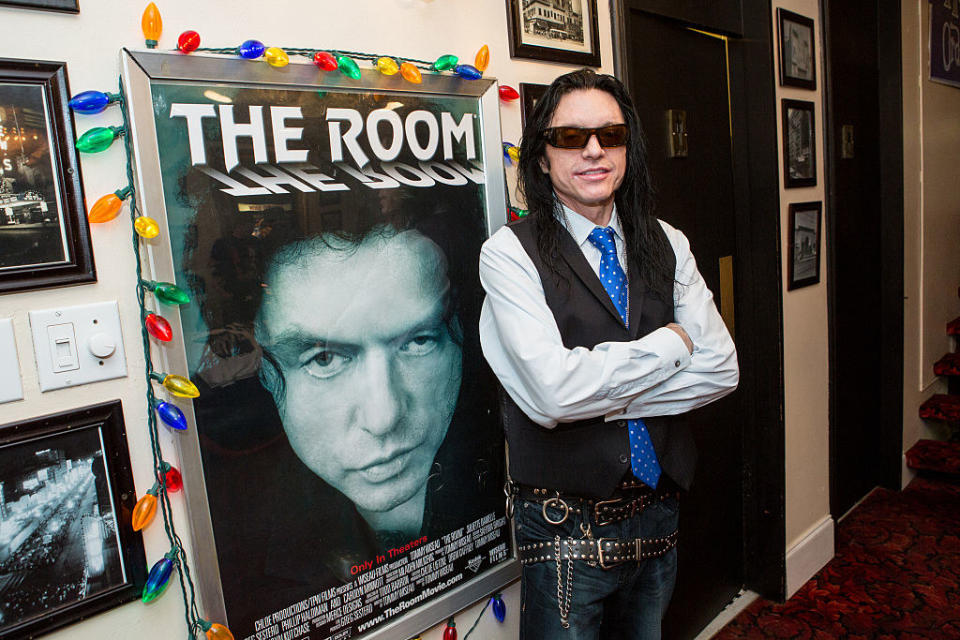
The movie's terribleness is evident in its many unresolved subplots, long and awkward sex scenes, blurry and unfocused shots, low-quality effects, and countless framed pictures of spoons.
Director/writer/lead actor Tommy Wiseau made notoriously inexplicable decisions with the film's $6 million. For example, though he refused to pay for air conditioning or allow the cast to have water bottles, he insisted on building a private on-set bathroom for himself.
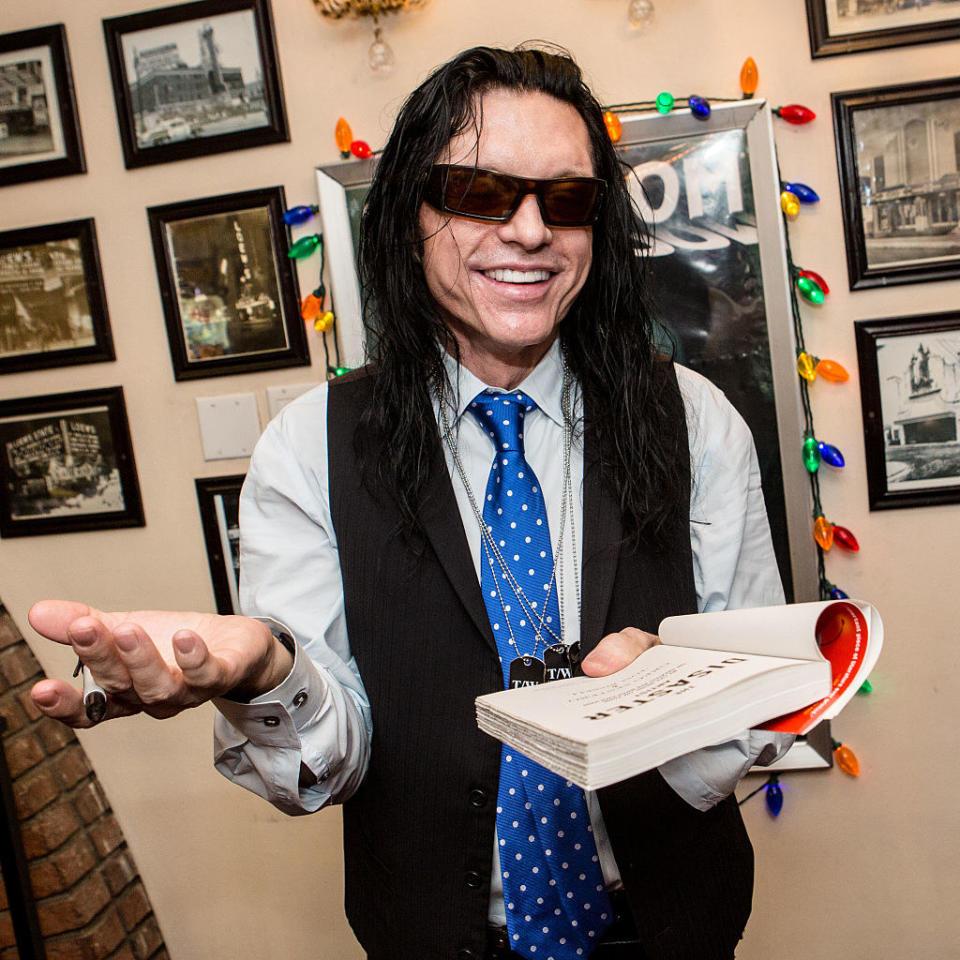
He also shot the movie on a 35mm format film camera and a digital HD camera at the same time, but he ended up throwing out the digital footage entirely.
Despite — or perhaps because of — its strangeness, The Room became something of a cult classic. Initially, it only played in select theaters for two weeks, but a jarring billboard that loomed over West Hollywood for five years advertised the film with Wiseau's headshot, a website, and a phone number.
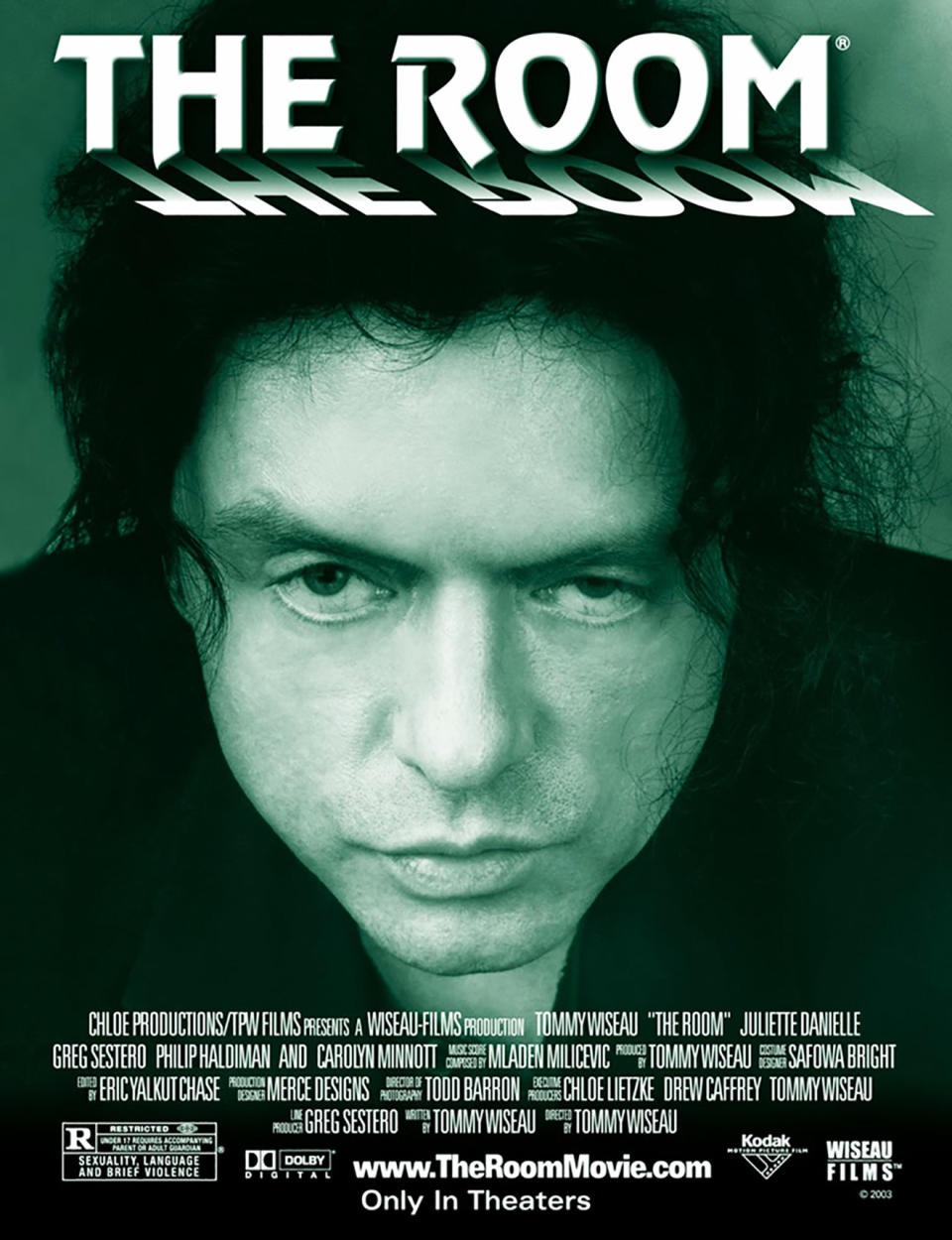
The movie reportedly only grossed $1,900 during its initial release, but he spent $5,000 a week to keep that billboard up.
When the billboard was finally taken down, fans were already gathering for midnight screenings. They threw plastic spoons at the screen when one of the framed spoon pictures was shown, performed skits, and yelled at the screen.

The movie also had a handful of famous fans, including Kristen Bell, Jonah Hill, and Paul Rudd.
The script started as a play then morphed into a novel before reaching its final evolution as a film. Wiseau produced it himself and didn't reach out to studios until the distribution stage. He told Portland Mercury, "Because you see, The Room is just...I wanted to do it my way, okay? My way or the highway, you know the story."
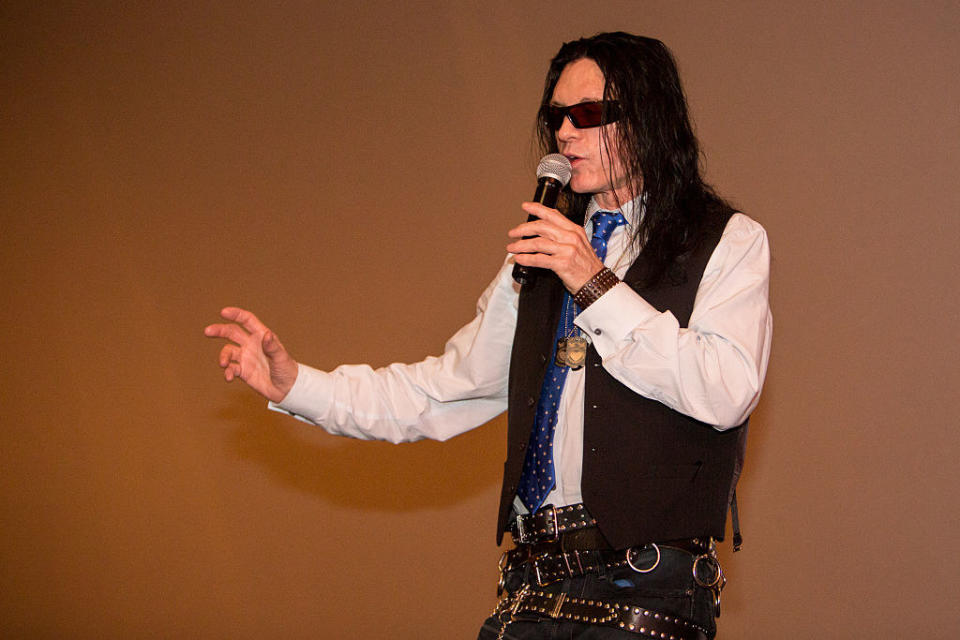
Addressing issues he had with the crew, he said, "Much was related to the way I wanna film it. The way I wanna present the audiences, you see. And that was the dilemma. You know, long story short, to be nice, some people have a different point of view, let's put this way [laughs]. So, I wanna do my way that's basically... see, The Room is not the regular cookie cutter from Hollywood, as you probably noticed, and it's something that is different and I have a different approach in this particular project."

 Yahoo Lifestyle
Yahoo Lifestyle 
